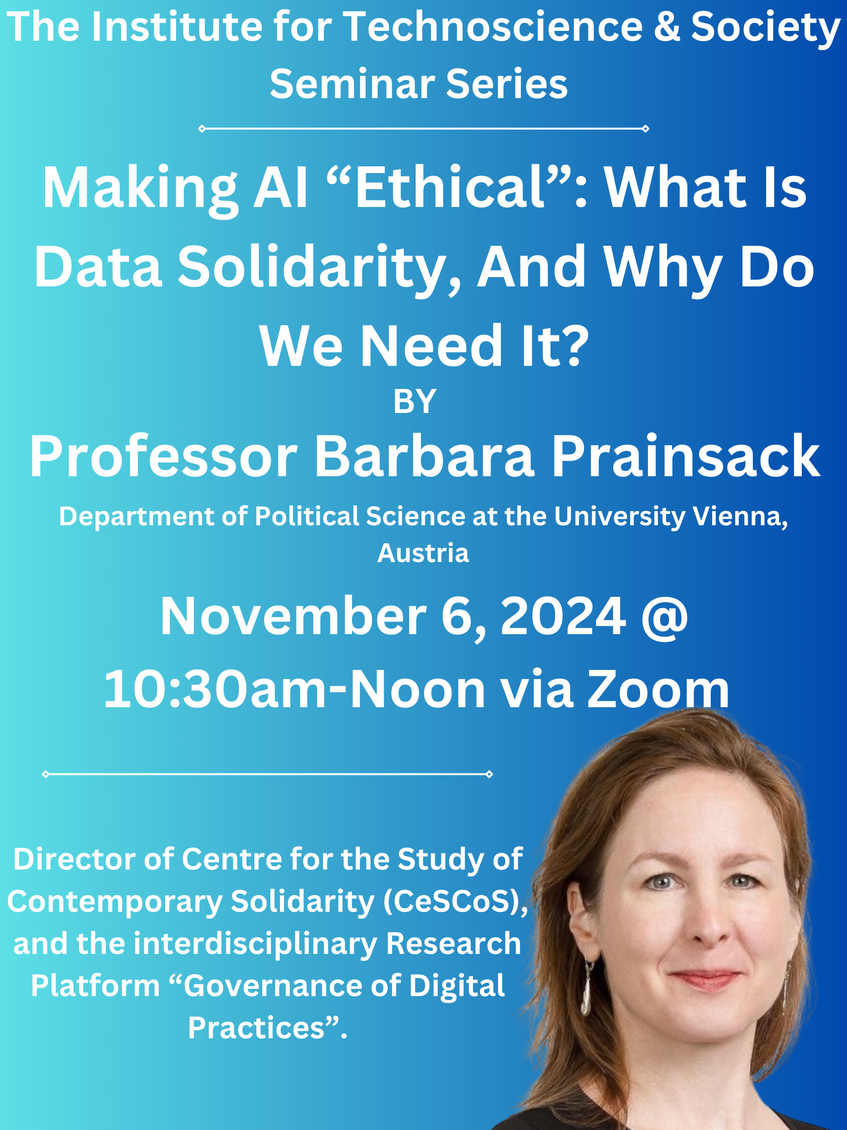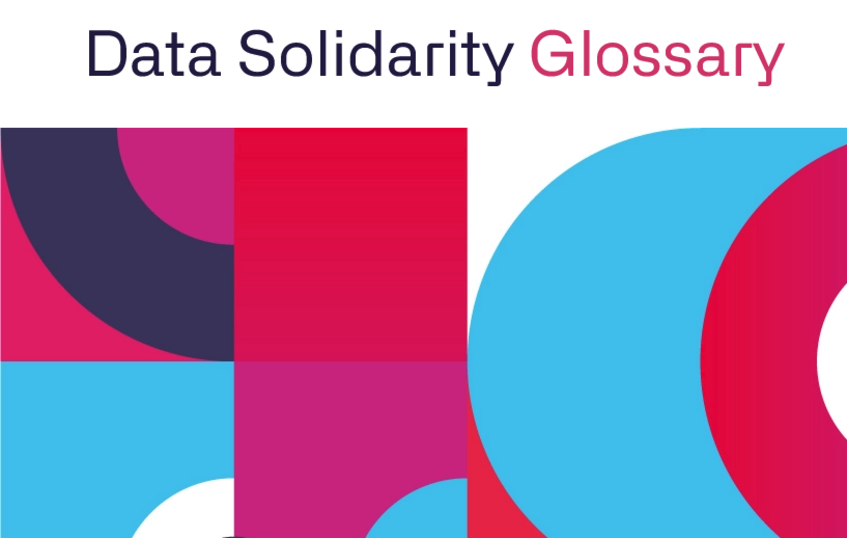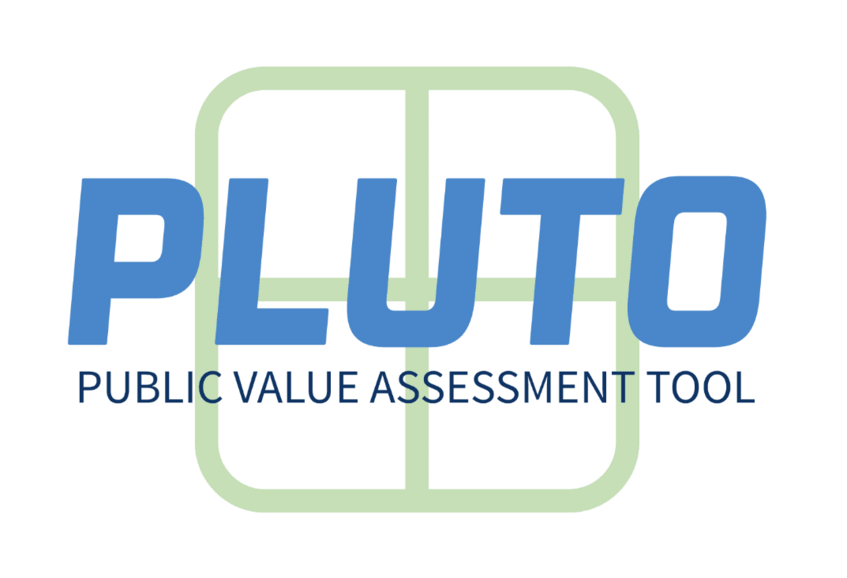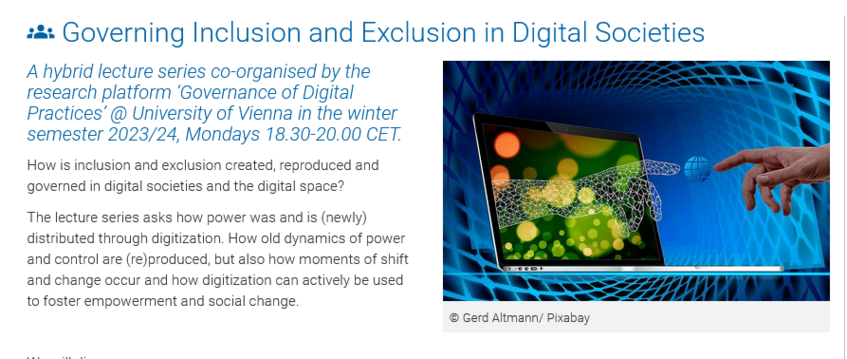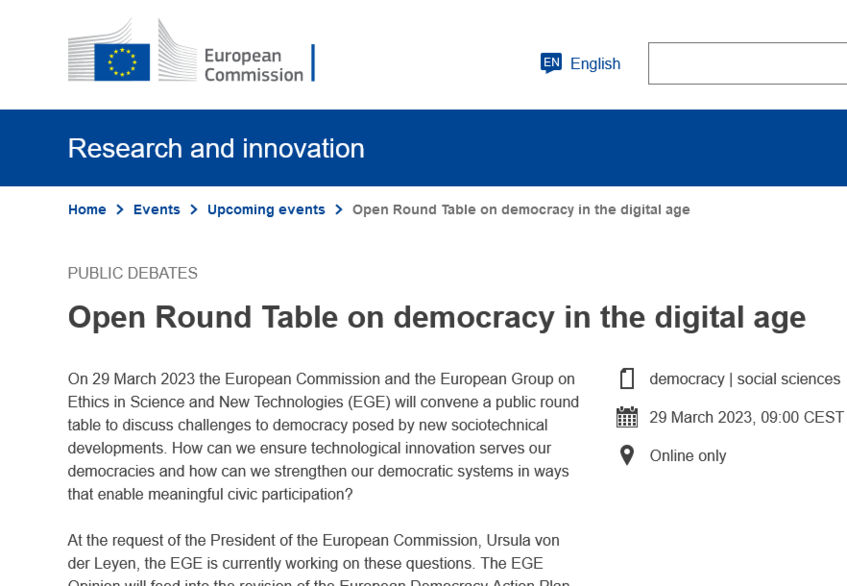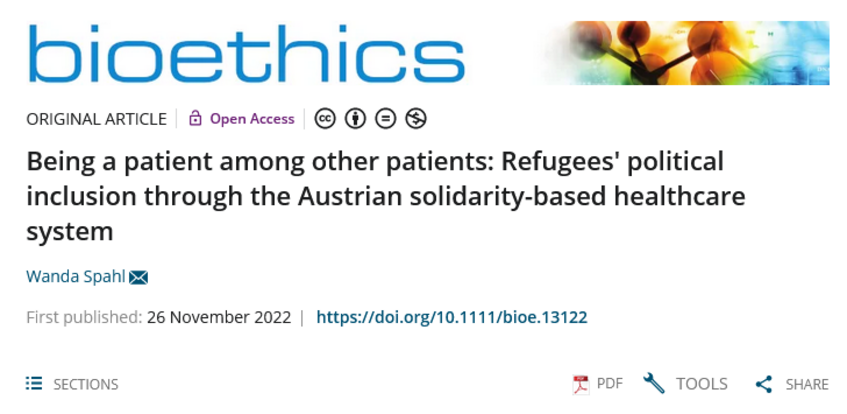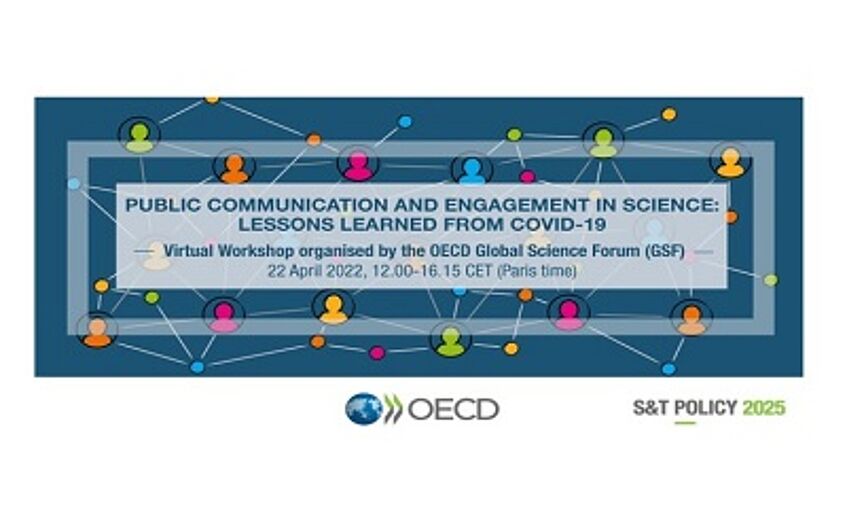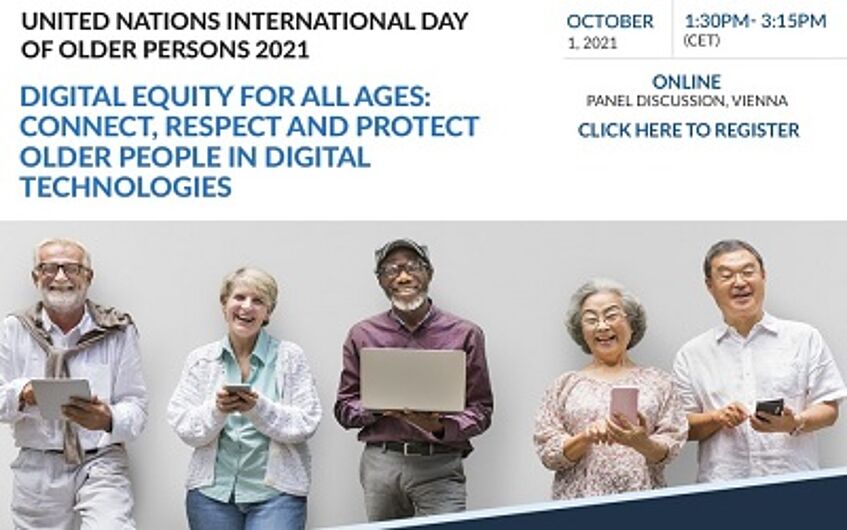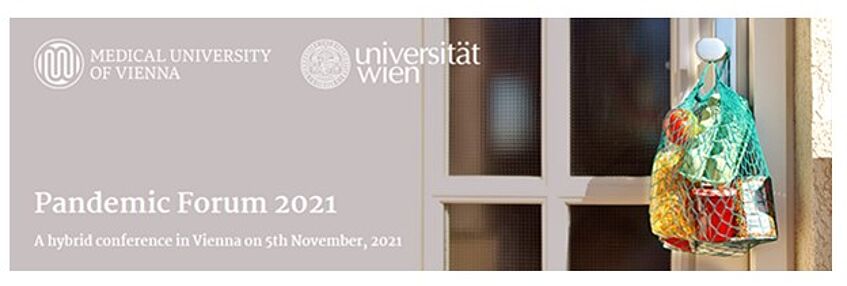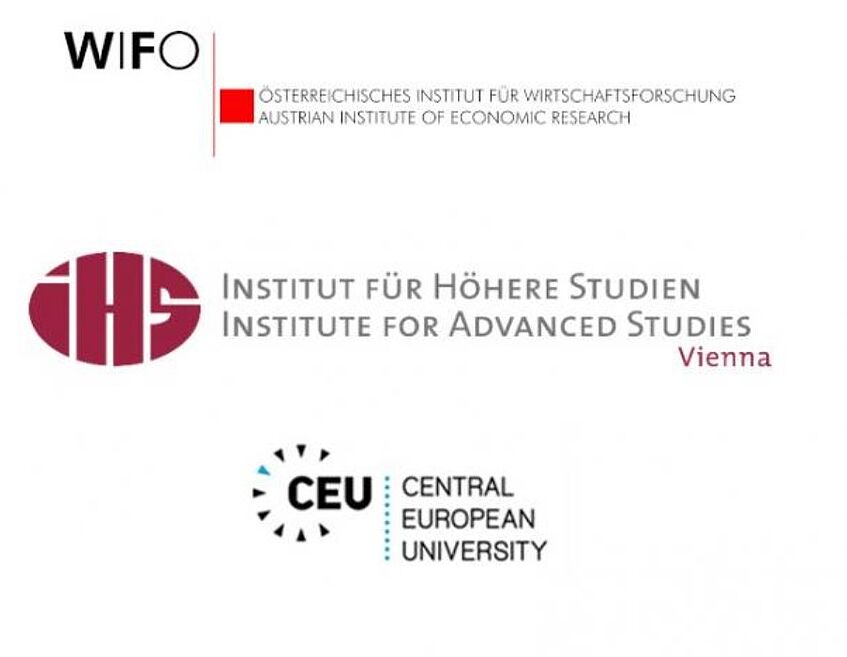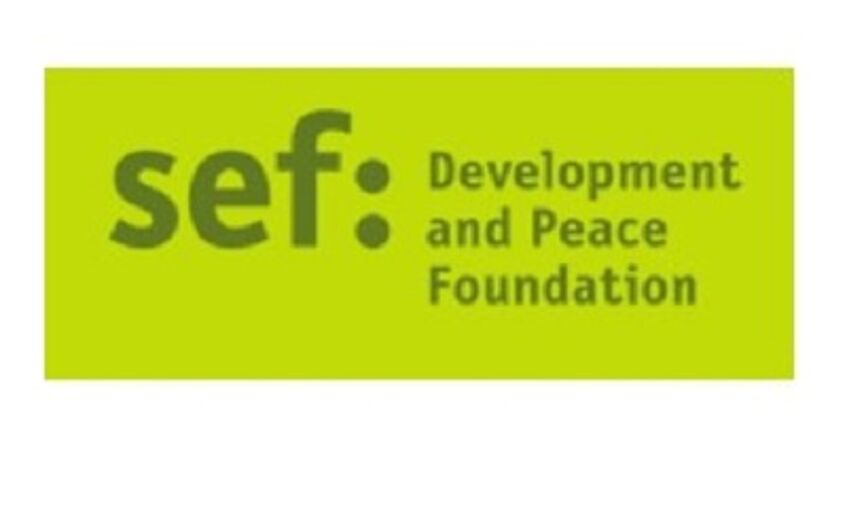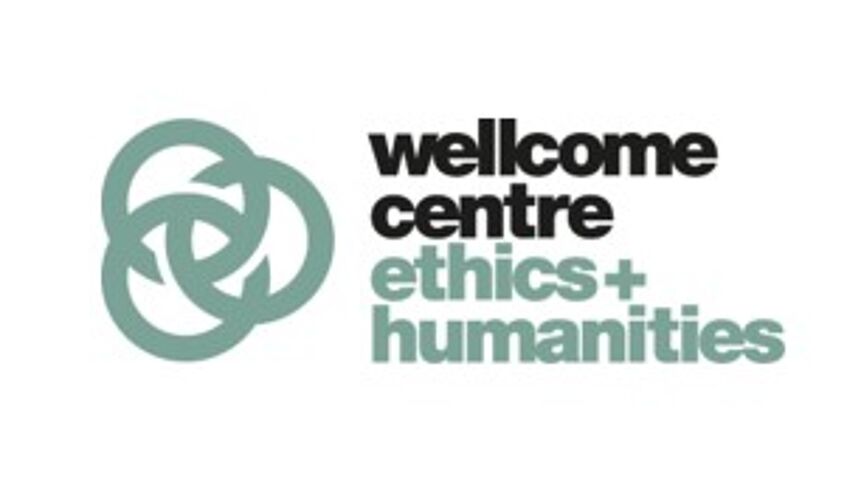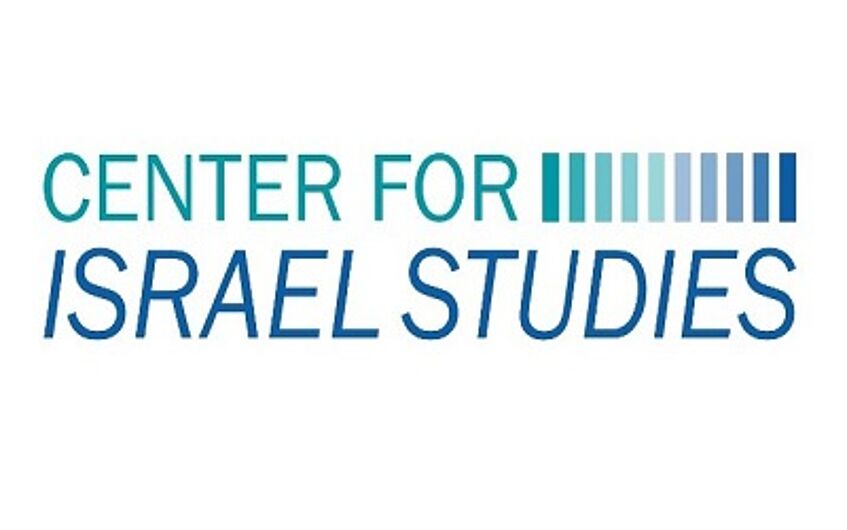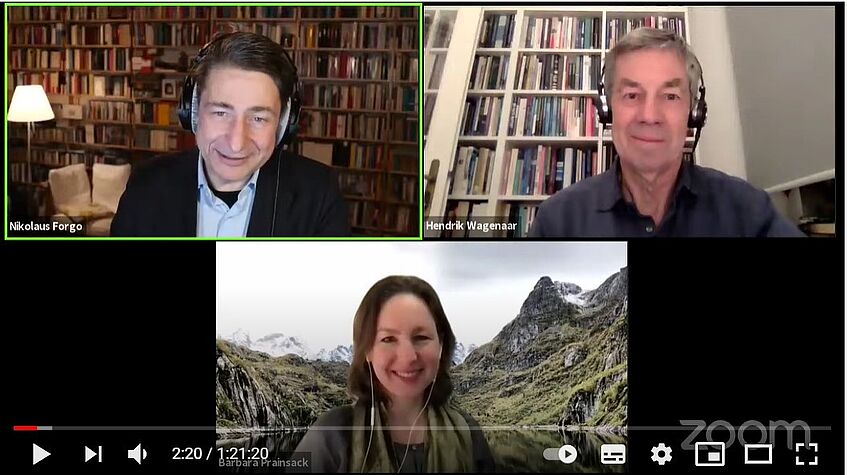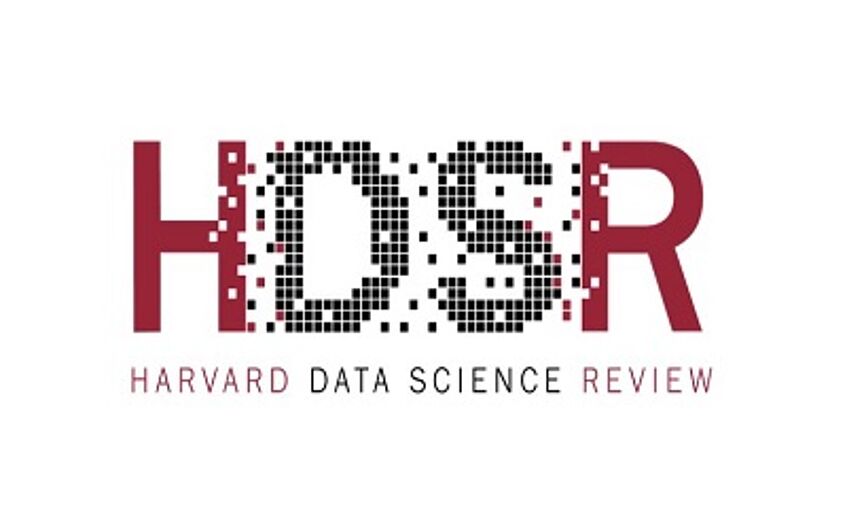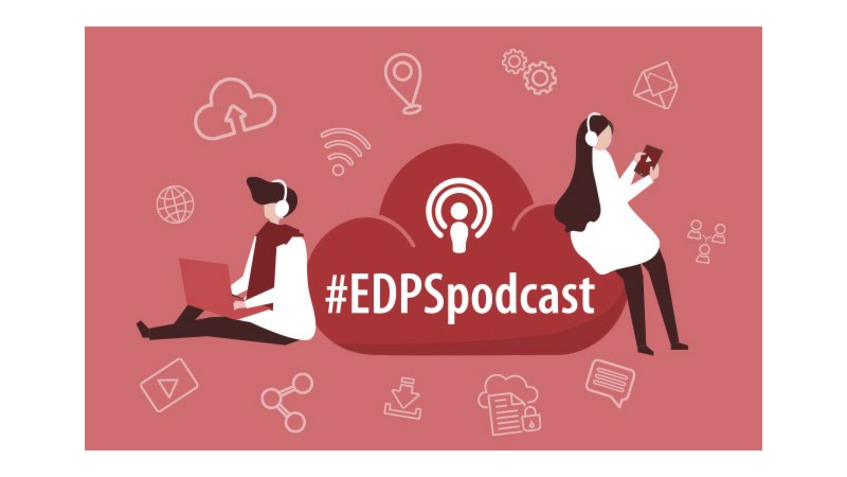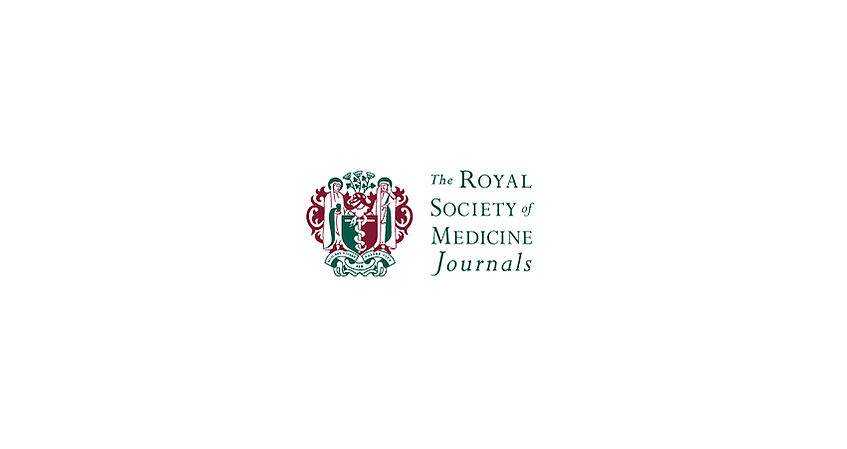News
Making AI “ethical”: What is data solidarity, and why do we need it?
Barbara Prainsack is giving a talk via Zoom at The Institute for Technoscience and Society at York University on the 6th of November at 10:30am EST. Join us for this interesting talk!
The challenge of developing effective policies and guidelines for the ethical governance of AI is a much discussed issue. Studies show that ethical guidelines for AI in particular have had little impact on practice so far. In this talk, I will argue that a root cause of this problem is the blindness of most policies and guidelines to the relational nature of data. Data are not atomistic bits of information, but they have emerged from, and encapsulate, relations between different kinds of entities. Digital data also disclose information about wider ranges of entities than those that the data come from. Digital practices such as predictive analytics have further deepened the relationality of data. Today, the relationality of data is the de facto business model underpinning entire industries, such as targeted advertising or social media. Because the intrinsic relationality of data is not, however, sufficiently recognised in the way data are conceptualised and governed, corporations and authorities can pretend that the data they collect can be separated from people, while profiting from their relationality at the same time. I will end by outlining “data solidarity” as an approach that acknowledges the relationality of data, and with it, the stakes that people – as individuals and as members of collectives – have in phenomena in the world that are datafied. In such a way, data solidarity is a precondition for the ethical governance of AI.
A new public health approach to data: Why we need data solidarity
Barbara Prainsack and co-author Ilona Kickbusch have just published this piece on the public value of data use and the concept of data solidarity in the British Medical Journal (BMJ).
Prainsack & Kickbusch. A new public health approach to data: Why we need data solidarity. BMJ 2024; 386. (Published 23 September 2024)
To understand more about the data solidarity approach check out the Data Solidarity Glossary here.
New publication: "Solidarity and trust in European Union health governance: three ways forward"
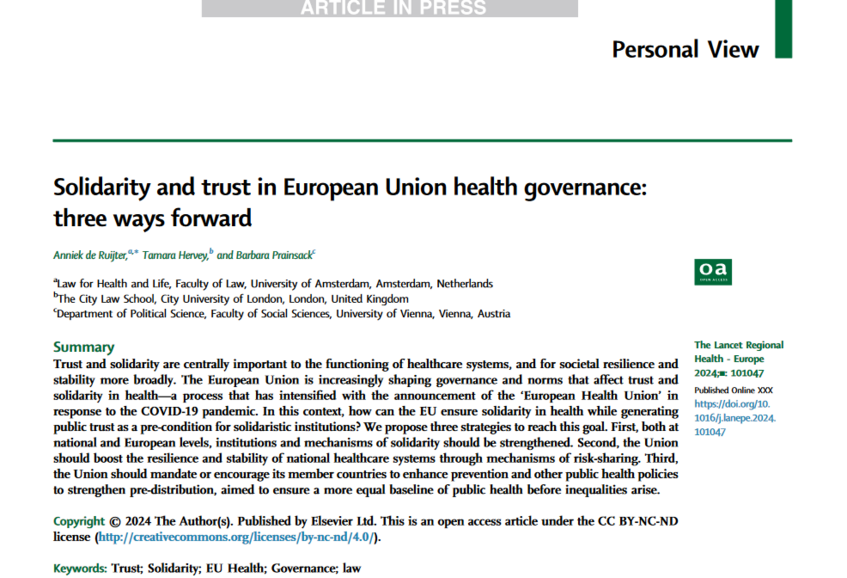

New publication: "Solidarity and trust in European Union health governance: three ways forward"
Congratulations to authors Anniek de Ruijter, Tamara Hervey and Barbara Prainsack on their new article published in the Lancet Regional Health journal!
Click here to read the full article.
And to read a response by the Belgian Vice-Prime Minister and Minister of Health and Social Affairs follow this link.
- 18.09.2024
We are excited to announce that the edited volume from the "Solidarity in Times of a Pandemic" Latin America consortium in Spanish has been published!
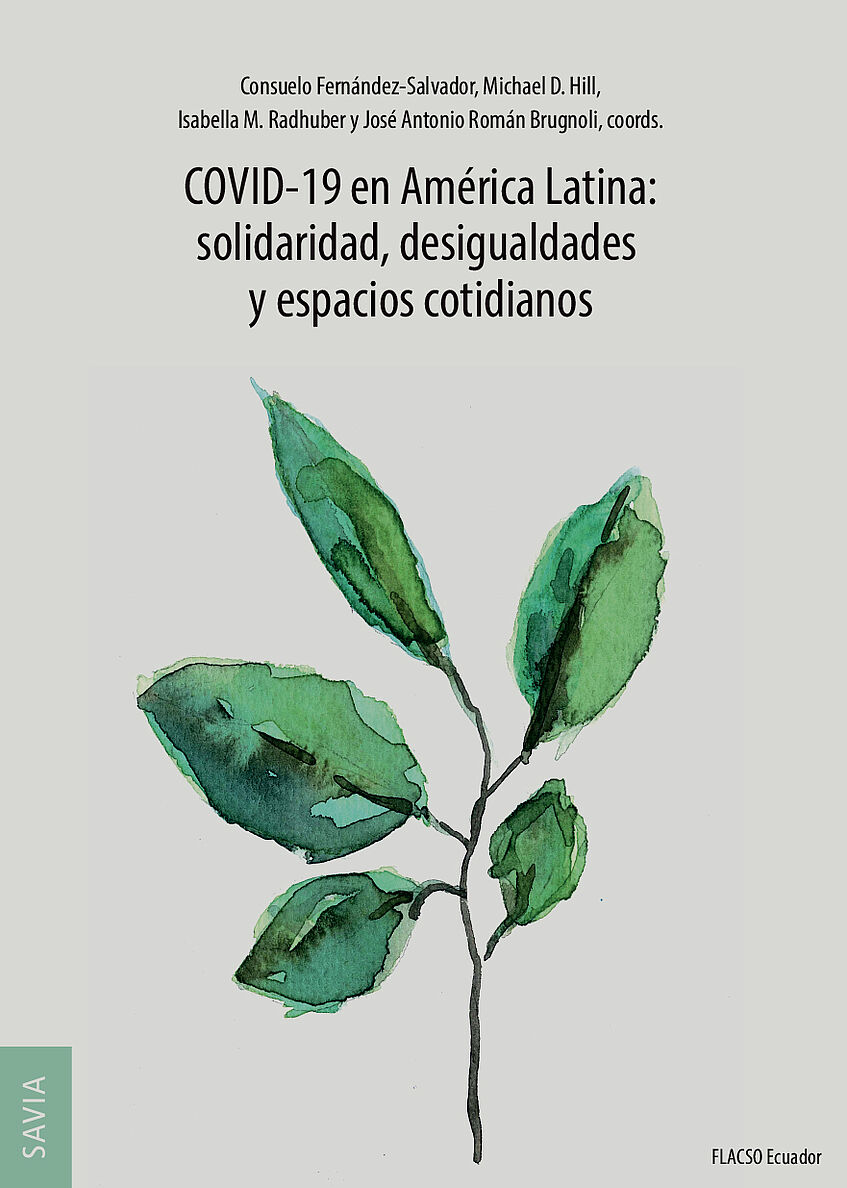

We are excited to announce that the edited volume from the "Solidarity in Times of a Pandemic" Latin America consortium in Spanish has been published!
'COVID-19 en América Latina: Solidaridad, desigualdades y espacios cotidianos' (FLACSO Ecuador, Ed.: Consuelo Fernández-Salvador, Michael D. Hill, Isabella M. Radhuber, José Antonio Román Brugnoli)
The focus of this compilation revolves around solidarity: how people cultivated, practiced or simply reactivated it during the pandemic in Latin America. This book is an invitation to the academic community to reflect not only on the impacts of COVID-19, but also on how solidarity research is being carried out in the region.
We have created a website in English/German/Spanish announcing the publication of the book, on this page you will also find links to buy the book and to download the PDF version for free:
ES https://digigov.univie.ac.at/es/projects/solpan-america-latina/spanisch/
DE https://digigov.univie.ac.at/de/projects/deutsch/deutsch/
- 03.06.2024
CeSCoS memebr Antonia Modelhart is a contributor in this newly published book!
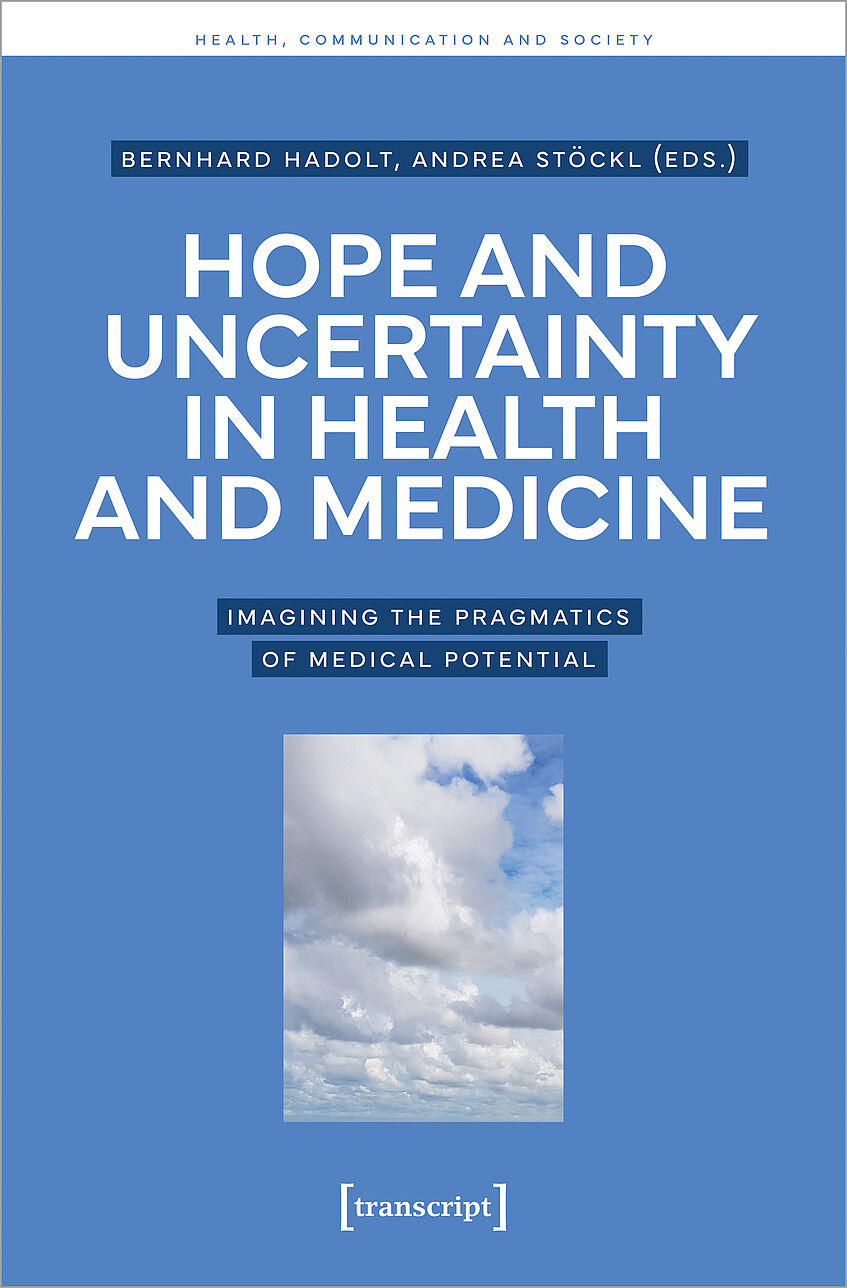

CeSCoS memebr Antonia Modelhart is a contributor in this newly published book!
Antonia Modelhart contributed the chapter titeld "The Uncertain Future of Antibiotics Navigating Bacterial Presence in Hospitals amidst Antimicrobial Resistance".
Book Abstract:
"In health and medicine, imagining the future is essential in giving meaning to the past and the present and for propelling people into action. This is true not only at the level of individuals as they envision and carry out everyday activities and long-term plans but also for institutional practices framed by and unfolding within various socio-political ecologies and transfigurations. Hope and uncertainty are critical affective and knowledge-related modalities of such imaginations and assume vital meanings in policing, managing, and experiencing health, illness, and well-being. This volume brings together contributions from medical anthropologists who address this theme across various medical spheres, including the pragmatics of hope and uncertainty, the techno-sphere, health management, and individual and socially distributed emotions."
The book is available here Open Access.
- 27.05.2024
New Book Publication: "Sicherheitsempfinden und bedingungsloses Grundeinkommen"


New Book Publication: "Sicherheitsempfinden und bedingungsloses Grundeinkommen"
Congratulations to CeSCoS member Elias Weiss, who has just published a book on the topic of universal basic income as co-author!
More information and a short abstract of the book can be found at this link.
The book is in German.
Manfred Matzka's Neues Buch "Schauplätze der Macht"


Manfred Matzka's Neues Buch "Schauplätze der Macht"
Alle sind Herzlich Eingeladen zur Buchpräsentation am 17.11.2023 um 19:00!
Wo: Buchhandlung Thalia, 1030, Landstr. Hauptstraße 2a
Für mehr Information besuchen Sie diesen Link.
The Public VaLUe Assessment TOol (PLUTO) has been launched!
CeSCoS director Barbara Prainsack and members Connor Hogan and Seliem El-Sayed, among others, helped to develope this online tool. It can be used by anyone, such as representatives of businesses or public bodies, wanting to know how much public value specific uses of data may create, or patients and other citizens who are asked to share their data to be used for specific purposes.
For more information and to see a video from the day the tool was launched at the World Health Summit 2023 click here.
Governing Inclusion and Exclusion in Digital Societies: A Lecture Series Organised by the Research Platform Governance of Digital Practices
See here for more information and on how and when to attend: https://digigov.univie.ac.at/teaching/digigov-lecture-series-governing-inclusion-and-exclusion-in-digital-societies/
Winter semester 2023/2024, Mondays from 18:30 - 20:00.
Hope to see you there!
Event Ankündigung:"40 Stunden, echt jetzt? Wie wir in Zukunft arbeiten?"
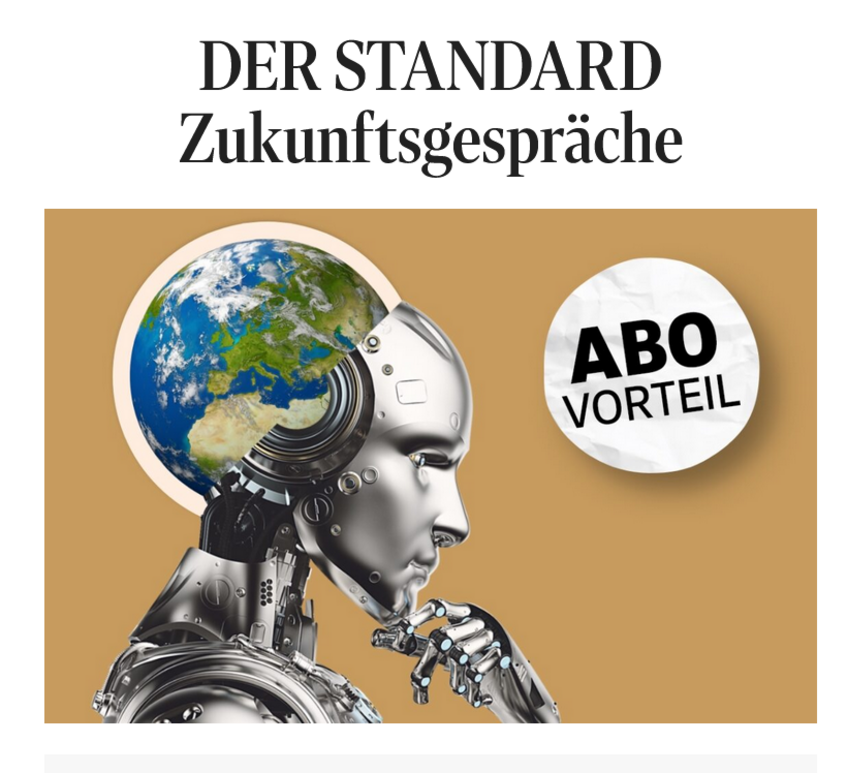

Event Ankündigung:"40 Stunden, echt jetzt? Wie wir in Zukunft arbeiten?"
Am 12. September um 19:30, lädt Der Standard zu einer Veranstaltung über die
Zukunft der Arbeit - DER STANDARD Zukunftsgespräche
Barbara Prainsack wird die Keynote halten und auf dem Panel sitzen.
Für weitere Informationen und zur Anmeldung folgen sie diesen Link: https://abo.derstandard.at/abovorteile/2023/06/der-standard-zukunftsgesprache-2/
EGE Issues Opinion on Democracy in the Digital Age
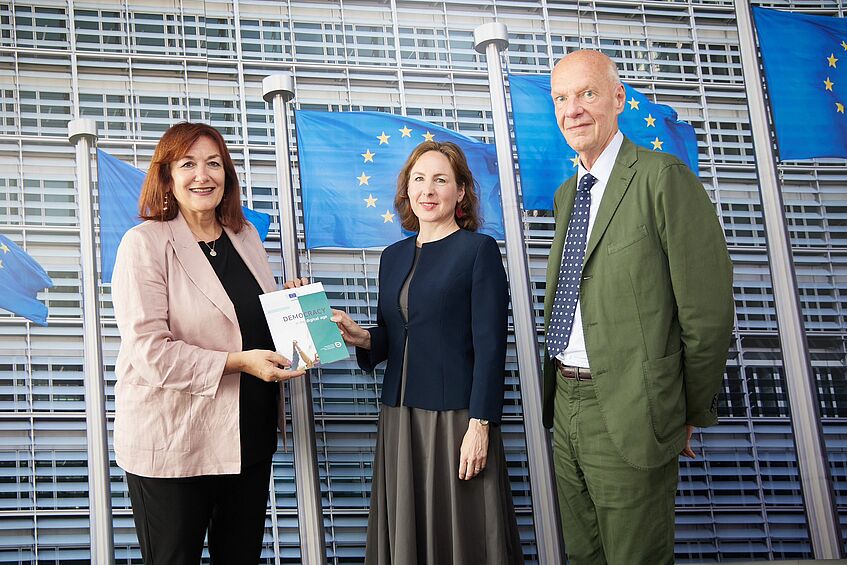
Left to right: Dubravka Šuica, Barbara Prainsack, Nils-Eric Sahlin

Left to right: Dubravka Šuica, Barbara Prainsack, Nils-Eric Sahlin
EGE Issues Opinion on Democracy in the Digital Age
The European Group on Ethics in Science and New Technologies, with Barbara Prainsack as Chair, have issued the Opinion on Democracy in the Digital Age. It was handed over to the European Commission Vice President Dubravka Šuica on June 20, 2023.
You can read more on the opinion here.
"Teaching Multiplicities: Von der Arbeit mit multi-medialen Arbeiten"
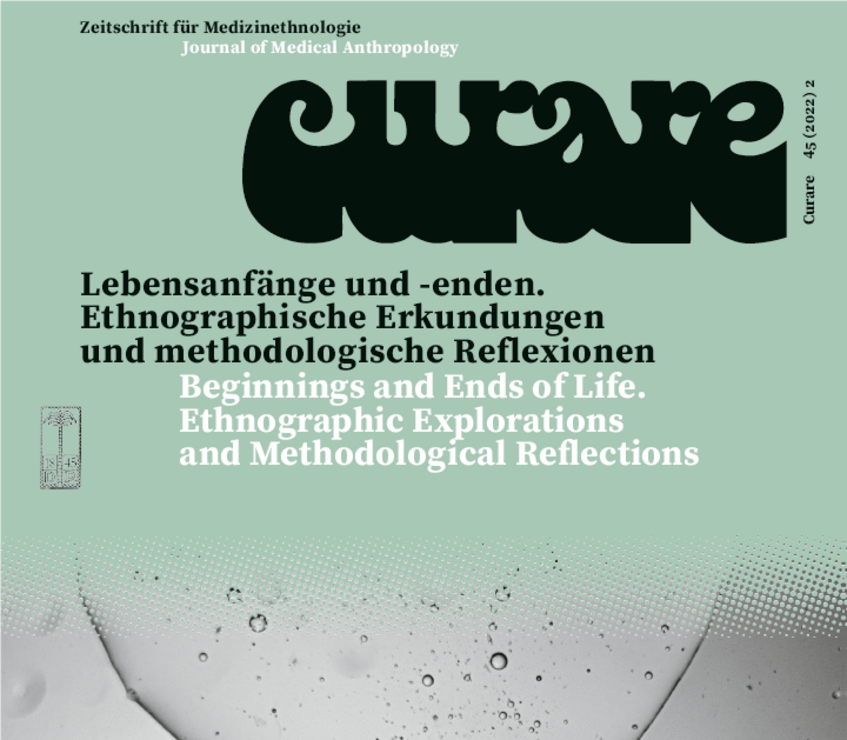
Screenshot of Curare front cover edition 45 (2022) 2

Screenshot of Curare front cover edition 45 (2022) 2
"Teaching Multiplicities: Von der Arbeit mit multi-medialen Arbeiten"
This new article, written by CeSCoS member Magdalena Eitenberger and co-author Lisa Lehner, has been published in the newest edition of the Journal of Medical Anthropology - Curare.
Upcoming Exhibition: GEOGRAPHY OF GHOSTS
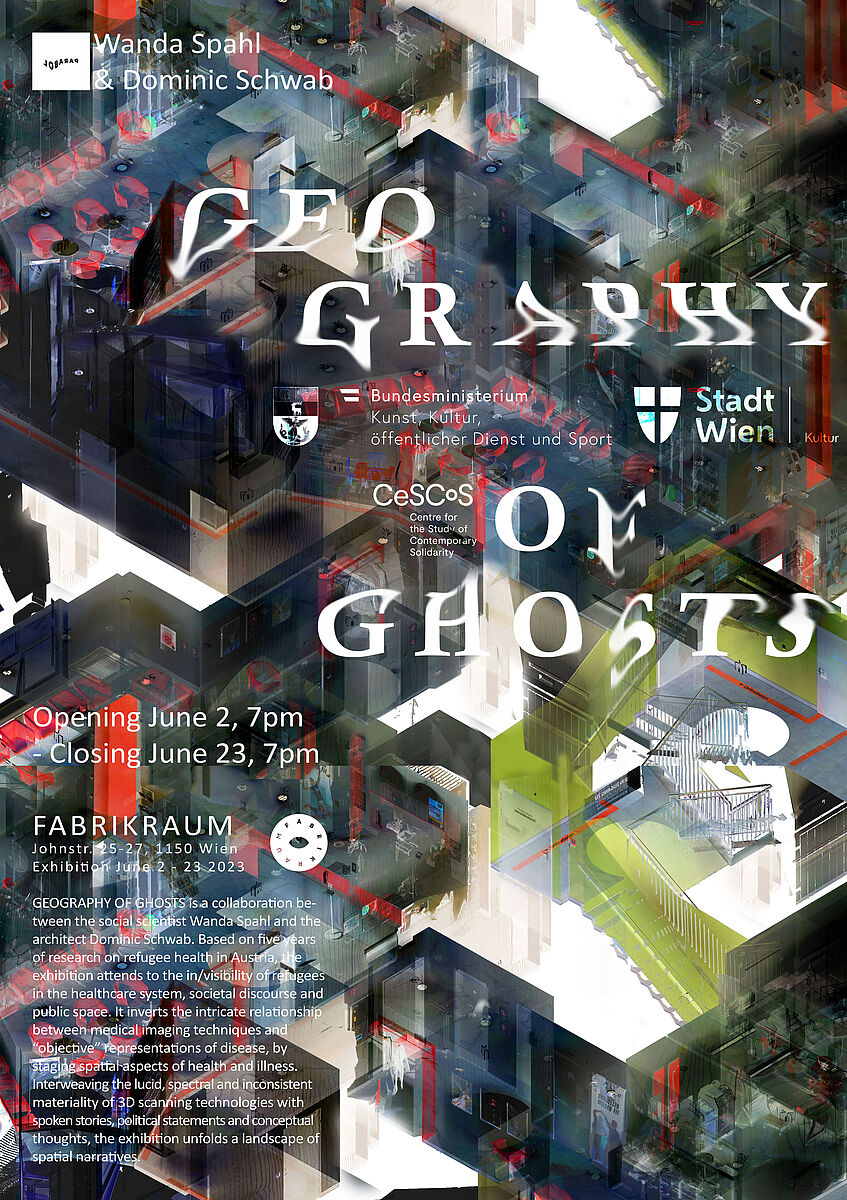

Upcoming Exhibition: GEOGRAPHY OF GHOSTS
GEOGRAPHY OF GHOSTS is a collaboration between the social scientist Wanda Spahl and the architect Dominic Schwab. Based on five years of research on refugee health in Austria, the exhibition attends to the in/visibility of refugees in the healthcare system, societal discourse and public space. It inverts the intricate relationship between medical imaging techniques and “objective” representations of disease, by staging spatial aspects of health and illness. Interweaving the lucid, spectral and inconsistent materiality of 3D scanning technologies with spoken stories, political statements and conceptual thoughts, the exhibition unfolds a landscape of spatial narratives.
Program
June 2 - 23 at Kunstraum Fabrikraum
Will UBI (Really) Change the World? Global Evidence on Basic Income
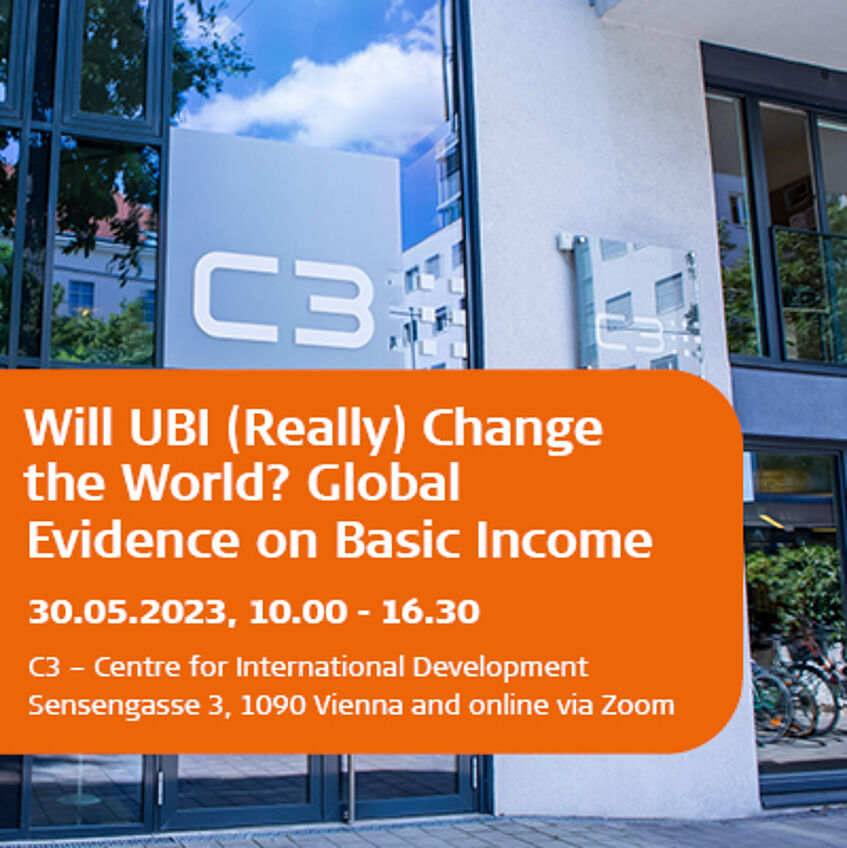

Will UBI (Really) Change the World? Global Evidence on Basic Income
30.05 from 10:00 - 16:30 at the Centre for International Development
Targeted cash transfers have been hotly discussed in policy circles since at least
the early 2000s when programs such as Brazil’s Bolsa Família made history.
More recently, the debate has shifted towards Unconditional Basic Income (UBI)
and how such alternative schemes could provide for an effective and dignified
social and development policy. Jointly organized by the Center for Contemporary Solidarity Studies (CeSCoS) of the University of Vienna and the Austrian Foundation for Development Research (OeFSE), this small symposium brings together a group of experts to discuss the aspirations and realities of UBI interventions in the Global South and beyond. The event is free and open to all.
Please register at anmeldung@oefse.at and let us know if you will be attending onsite or online.
Join us May 3, 2023 from 18:00-19:30 CEST in the conference room of the Political Science Deparment!
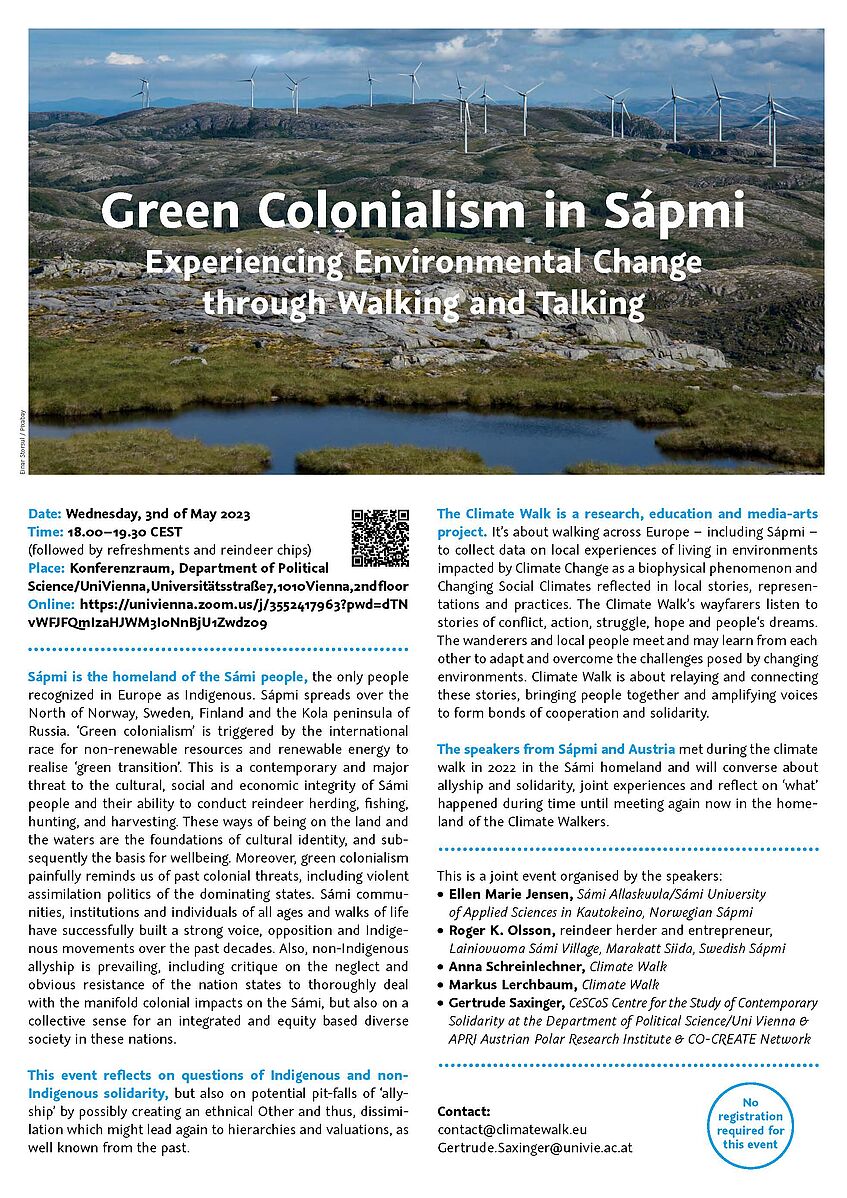

Join us May 3, 2023 from 18:00-19:30 CEST in the conference room of the Political Science Deparment!
Sápmi is the homeland of the Sámi people, the only people recognized in the Europe as Indigenous. Sápmi spreads over the North of Norway, Sweden, Finland and the Kola peninsula of Russia. ‘Green colonialism’ is triggered by the international race for non-renewable resources and renewable energy to realise ‘green transition’. This is a contemporary and major threat to the cultural, social and economic integrity of Sámi people and their ability to conduct reindeer herding, fishing, hunting, and harvesting. These ways of being on the land and the waters are the foundations of cultural identity, and subsequently the basis for wellbeing.
This event reflects on questions of Indigenous and non-Indigenous solidarity, but also on potential pit-falls of ‘allyship’ by possibly creating an ethnical Other and thus, dissimilation which might lead again to hierarchies and valuations, as well known from the past.
The speakers from Sápmi and Austria met during the climate walk in 2022 in the Sámi homeland and will converse about allyship and solidarity, joint experiences and reflect on ‘what’ happened during time until meeting again now in the homeland of the Climate Walkers.
This event takes place in person at the department of political science and on Zoom.
March 29th 9:00 Online: Open Round Table on Democracy in the Digital Age
29 March 2023, 09:00 - 11:45, Online
The European Commission and the European Group on Ethics in Science and New Technologies (EGE) have organized a public round table to discuss challenges to democracy posed by new sociotechnical developments. At this round table a wide array of stakeholders, from academia to industry to civil society organizations, will address questions such as: “How can we ensure technological innovation serves our democracies and how can we strengthen our democratic systems in ways that enable meaningful civic participation?” This is an opportunity for dialogue between experts and participants, and to further the work of the EGE’s recommendations.
Infodemics Pandemics Summer School

Copyright © 2022, 2023 by University of Lübeck / IMIS

Copyright © 2022, 2023 by University of Lübeck / IMIS
Infodemics Pandemics Summer School
Check out the Infodemics Pandemics Summer School 2023 - an 8-day interdisciplinary event bringing researchers together to discuss pandemics and information dissemination. The summer school takes place in Lübeck, Germany, from August 26th to September 3rd.
Webinar - On Resilience and Solidarity in a World in Crisis


Webinar - On Resilience and Solidarity in a World in Crisis
In this joint event held by the European Group on Ethics, SAPEA, and Academia Europaea, Barbara Prainsack and other experts speak about wellbeing - social, economic, health, etc. - in times of crisis. They discuss the following quesitons: How do we build resilient communities? How can societies provide support during crises, and distribute burdens and benefits equitably? Can solidarity be a guiding principle for addressing these concerns? Have a look here.
New Article on the Meaning of Solidarity in the Austrian Healthcare System
Wanda Spahl's new article - titled "Being a patient among other patients: Refugees' political inclusion through the Austrian solidarity-based healthcare system" - discusses what solidarity means and can mean, at the example of refugees' healthcare experiences in Austria. The Austrian healthcare system is characterized by a so-called "civic solidarity". It exercises institutionalized obligations toward citizens and ensures their medical care. The article shows how the healthcare system also implements political forms of solidarity: Through access to general medical services, marginalized groups such as refugees are politically included. Detailed examples from the lived experiences of refugees show that solidarity based health systems can be a driver for shaping positive relationships between immigrants and the host country. The open access article can be found here.
New Podcast Episode About Solidarity During the Pandemic and After - a discussion with Prof. Dr. Barbara Prainsack
"What does solidarity mean exactly? Why do we act in solidarity and what does acting in solidarity cost us?" Prof. Dr. Barbara Prainsack (Chair of the European Group on Ethics in Science and New Technologies) and Prof. Dr. Alena Buyx (Chair of the German Ethics Council) discuss answers to these questions and more in the episode "Long Live Solidarity - But Why Actually?" Listen here and wherever podcasts are available.
Seminar: "What experts? Whose advice? The 'Delphi oracle' and 'Moses tablets' in the management of the covid19 health emergency in Italy"


Seminar: "What experts? Whose advice? The 'Delphi oracle' and 'Moses tablets' in the management of the covid19 health emergency in Italy"
When: 5 May 2023, 12:00 - 14:00
Where: Conference room (A222), Department of Political Science, University of Vienna, Universitätsstr. 7/2nd floor, 1010 Vienna
In this talk Silvia Camporesi will present the results of the Italian branch of the international research project ESCaPE (Evaluating Scientific Advice in a Pandemic Emergency) which she led in 2020-21 and which aimed at understanding how expert advice was sought, produced, and utilized in the management of the Covid-19 emergency in Italy. This case study provides an overview and encompassing representation of the mobilization of experts, and of selected types of evidence, in Italy in 2020. Their findings suggest that expert politics can lead to the confirmation of knowledge hierarchies that privilege hard sciences, and corroborate prior literature indicating that economic and social expertise has not been well integrated into public health expert advice, constituting a major challenge for policymaking during an emergency. You can find further information here as well as the full article published in nature here.
Silvia Camporesi is a bioethicist with a longstanding interest in technologies and health, and an interdisciplinary background in medical biotechnology, ethics, and social sciences. She is affiliated with the Department of Humanities and Social Sciences at University of California, San Francisco, and with the Department of Global Health and Social Medicine at King’s College London. Silvia is author of more than 50 peer reviewed articles in a variety of medical ethics, bioethics, and scientific journals, and two books. She is Associate Editor of the Journal of Bioethical Inquiry and Trustee of the Institute of Medical Ethics (UK), as well as member of the World Anti Doping Agency Ethics Advisory Expert Group. Silvia is currently working on her third book on the construction of categories in sport (Fandango, 2023). She also writes for a variety of media outlets, including AEON, the International Public Policy Observatory, and the Conversation. You can find out more about her research here.
Public communication and engagement in science: Lessons learned from COVID-19
Barbara Prainsack was invited as a speaker at the OECD Virtual Workshop "Public communication and engagement in science: Lessons learned from COVID-19" that took place on 22 April 2022 online. The recording of Session 3 about "Public engagement and mobilisation in science and science advice during crises" is available here.
How do democracies die? The 6th Navigating Knowledge Landscapes’ Annual Conference
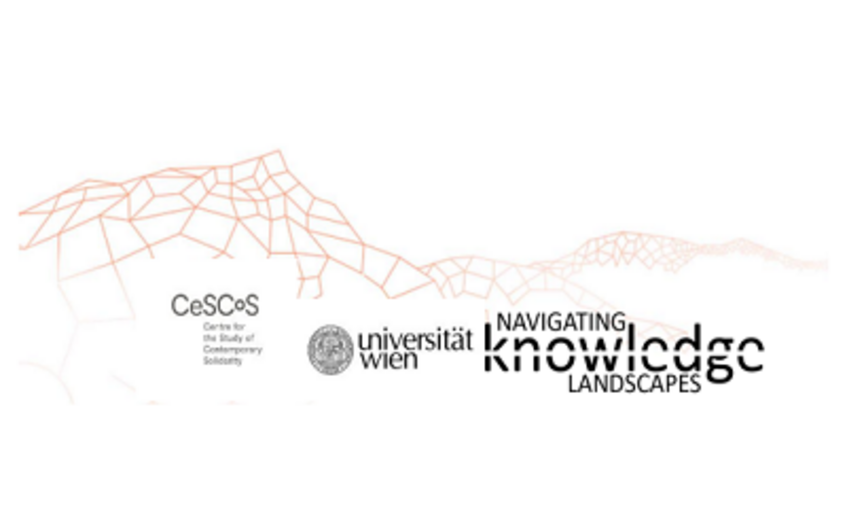


How do democracies die? The 6th Navigating Knowledge Landscapes’ Annual Conference
The Centre for the Study of Contemporary Solidarity (CeSCoS) is organizing the 6th Navigating Knowledge Landscapes’ Annual Conference
When: 5 May 2022
Where: Alois-Wagner Saal, C3 Centre for International Development, Sensengasse 3, 1090 Vienna, Austria
In the last decades, countless books, articles, and reports have speculated, or even diagnosed, deep crises of democracies throughout the world. Although it could be argued that the Covid-19 pandemic has fuelled a crisis of government, rather than a crisis of democracy, in most places, it has doubtlessly increased political polarisation and exacerbated inequalities across and within societies. How democracies die, and what roles digital practices and technologies play in this process, stands in the centre of this one-day multidisciplinary conference.
Further information
Seminar: “For-profit companies don’t care about patients’ well-being” data and sharing in Germany
On average, Germans seem less willing to donate their medical and DNA data than residents of other countries. Why is this? Torsten Voigt and Barbara Prainsack, collaborators on the global "Your DNA, Your Say" project, provided some answers on the basis of the German data from the survey.
United Nations International Day: "Digital Equity for All Ages: Connect, Respect and Protect Older People in Digital Technologies"
Barbara Prainsack was invited as a speaker of the panel discussion "Digital Equity for All Ages: Connect, Respect and Protect Older People in Digital Technologies" as part of the United Nations International Day of Older Persons 2021.
Pandemic Forum 2021: Going viral: How a pandemic challenges society at large
Barbara Prainsack is one of the confirmed speakers at Pandemic Forum 2021, a hybrid conference to be held in Vienna on November 5, 2021.
The Medical University of Vienna and the University of Vienna are organizing an international forum on the challenges of the pandemic and its effects on our society – from pandemics in history to social, societal, political, and economic aspects of social and mental distancing.
A one-day conference for debates and exchanges over the challenges arising from the worldwide pandemic and, specifically, its effects on our societies at large with their stakeholders in sciences, politics, healthcare, arts and economy. This symposium shall bring together key opinion leaders from the bespoke traits of society for an open-minded, critical and constructive exchange.
EVIDENCE-BASED POLICY MAKING
Barbara Prainsack will be part of the Closing panel discussion (27 May 2021, 17:00-18:30), together with Martin Kocher (Federal Minister, Austrian Ministry for Labour), Thomas Starlinger (Security Advisor to the Federal President), Tobias Thomas (Director General of Statistics Austria, University of Düsseldorf), Christine Zulehner (Department of Economics, University of Vienna and WIFO). Moderation by Thomas König (IHS).
The discussion is part of the online conference "Evidence-based policy making", organised by the Austrian Institute of Economic Research, Institute of Advanced Studies and the Central European University.
The EU and Solidarity in Global Health Cooperation: Lessons from the Covid-19 pandemic
Barbara Prainsack will participate in the sef (Development and Peace Foundation): Policy Lunch on what solidarity means in concrete terms as a political concept guiding action in the international context. How can it be operationalised in global health cooperation? In particular, the discussion will focus on how the EU can contribute to institutionalising real solidarity in global health cooperation, based on the experience of international crisis management in the current pandemic.
The event will take place on 18 May 2021, 12.30-13.45hrs (CEST). Further information and the programme can be found here.
Please register by 16 May using this online form. You will then receive your personal access link for the Zoom meeting on the day before the event.
Why justice is not enough: Solidarity as guiding value for data governance
Barbara Prainsack will attend a WEH/Ethox seminar on the topic of "Solidarity as guiding value for data governance" on Wednesday, 21 April 2021, 2.30pm to 4pm.
Vaccination for Covid-19: Public views and experiences in Israel and Austria
The Center for Israel Studies is organising an online panel discussion with Yael Hashiloni-Dolev and Katharina T. Paul on the topic "Vaccination for Covid-19: Public views and experiences in Israel and Austria". The event will take place on March 10, 2021 at 6:00 p.m., and will be moderated by Barbara Prainsack.
Abstract: When it comes to vaccination for Covid-19, it seems, Israel and Austria could not be more different: Vaccination programmes are progressing at very different paces, and vaccine skepticism is differently distributed as well. What are the reasons for this? And is everything really as different as it seems at first sight? Two experts in the sociology of health and vaccination policy respectively will answer these and any other questions that participants may have.
Further information and registration here (please click).
Ars Boni: The Pandemic Within
Barbara Prainsack and Hendrik Wagenaar were guests at the podcast Ars Boni where they discussed with Nikolaus Forgó their forthcoming book "The Pandemic Within. Policy Making for a Better World". The book offers a perspective on political goods such as (public) housing, redefining work and income or good government in the light of the pandemic. The book will be published in August 2021.
The Department of Innovation and Digitalisation in Law started the podcast "Ars Boni" at the beginning of the Corona crisis. The legal and other effects of the epidemic have been discussed with various national and international guests in more than 100 episodes. The episodes are broadcasted live on Youtube and in various podcast apps.
The episode with Barbara Prainsack and Hendrik Wagenaar can be viewed here (please click).
Blue Chips and White Collars: Whose Data Science Is It?
In their article "Blue Chips and White Collars: Whose Data Science Is It?" (Harvard Data Science Review), Seliem El-Sayed and Barbara Prainsack comment on Sabina Leonelli’s article "Data Science in Times of Pan(dem)ic" and explore how data science can be better used for the next phase of the pandemic response and the role of scientists in this process.
First, particularly during a period in which many key features of society differ from its ‘normal’ functioning, it is important to systematically collect and analyze insights into people' practices and experiences, and recognize their value for policymaking. Besides, given the increasing frequency with which results from hypothesis-free data mining are presented as actionable, it is important to be aware of the difference between correlation and causality. For example, a U.S. study cited in the commentary found that counties with higher home values were correlated with higher mortality rates, that is, deaths associated with COVID-19. The authors of the study can only speculate about the reasons for this correlation. It thus becomes apparent that policymakers should resist the pressure to act quickly until the results from hypothesis-free data mining have been supplemented with causal models. Finally, how technologies affect different groups in society should be carefully studied to avoid reinforcing existing inequities related to access to technology and wealth.
The authors conclude that scientists must recognize that they are not merely conducting neutral analyses. By choosing a framing of the central problem of a research project, scientists also determine and limit the form of a possible solution. For example, if researchers attribute a low willingness to get vaccinated to a lack of information, a 'solution' to that problem is likely to be concerned with closing this information gap. This 'solution' would overlook the fact that a low willingness to get vaccinated may reflect more than people's attitudes towards vaccination - it may, for example, indicate a lack of trust in policy makers or a general sense of insecurity. The pandemic, in which the pressure to base policy on scientific evidence is particularly high, places a greater obligation on scientists to reflect on the norms, goals, and values that research articulates and promotes.
Workshop: Data is the new oil - Data Ethics
On 28 January 2021, Barbara Prainsack held a workshop at the Davos Digital Forum: Health Edition on the topic of data ethics.
In the digital era, data is often hailed as the new oil. This comparison, however, ignores that data – unlike oil – is not something that nature provides. Instead it is something that is curated by people, and often supported by infrastructures and technologies in and from the public domain.
No wonder, then, that the “data as oil” metaphor rubs some people the wrong way: it wrongly suggests that the companies use the data, and not the people from whom the data comes, have a moral – or even legal – right to own it.
Katharina Kieslich is member of the new HTAi - ISPOR Task Force
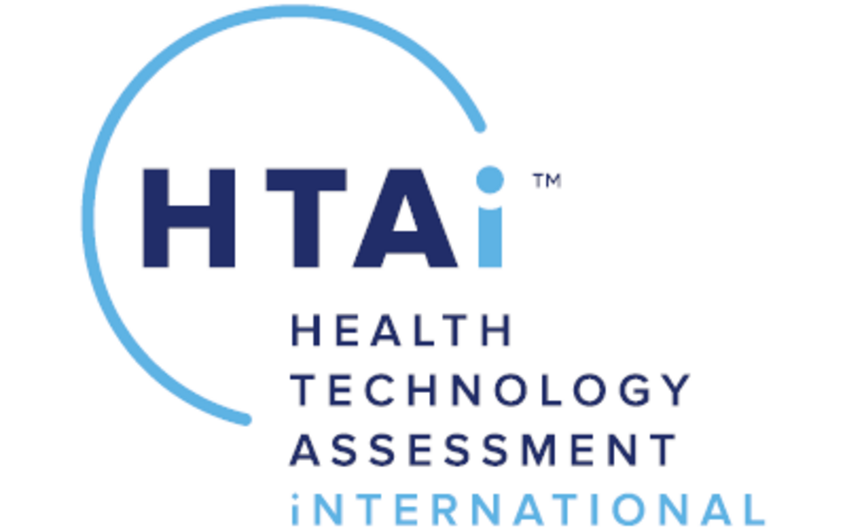


Katharina Kieslich is member of the new HTAi - ISPOR Task Force
HTAi (Health Technology Assesment international) is collaborating with ISPOR (The leading professional society for Health Economics and Outcomes Research) by initiating a joint task force on deliberative processes for HTA.
The task force’s goal is to develop a consensus definition for a deliberative process from an HTA perspective and internationally recognized good practice recommendations on the use of deliberative processes in HTA.
We warmly congratulate Katharina Kieslich on her new role in the joint HTAi - ISPOR Deliberative Processes for HTA Good Practices Task Force.
Find further information here
New briefing: COVID-19 antibody testing and ‘immunity certification’



New briefing: COVID-19 antibody testing and ‘immunity certification’
The Nuffield Council on Bioethics has published a policy briefing highlighting an urgent need for consideration of the ethical questions raised by COVID-19 antibody testing and immunity certification.
Antibody testing is currently being rolled out for research purposes but may offer a way to assess the risk of individuals being infected and transmitting the virus to others. It could also be used as the basis of a system of “immunity certification” or more complex risk profiling.
However, the prospect of “immunity certification” raises many ethical questions around respect for individual rights and interests and public health responsibilities and has wider societal implications. The negative impacts of certification are likely to fall disproportionately on those who are already socially marginalised and disadvantaged.
We believe there is an urgent need for public engagement and consideration of these complex ethical issues before further development of technologies and services based on antibody testing.
This briefing note summarises the key points of discussions at a multi-disciplinary expert meeting convened by the Nuffield Council on Bioethics on 24 April 2020.
With thanks to the meeting participants:
Chair: Professor Bobbie Farsides (Brighton & Sussex Medical School)
Professor Dr Steffen Augsberg (University of Giessen)
Victoria Butler-Cole QC (39 Essex Chambers)
Professor John Coggon (University of Bristol)
Professor Cam Donaldson (Glasgow Caledonian University)
Dr Jennie Evans (British Society for Immunology)
Dr Agamoni Ganguli-Mitra (University of Edinburgh)
Dr Carolina Haefliger (AstraZeneca)
Professor Jonathan Heeney (University of Cambridge)
Dr Stephen John (University of Cambridge)
Professor Jeffrey Kahn (Johns Hopkins University)
Professor Anne Kerr (University of Glasgow)
Dr Pete Mills (Nuffield Council on Bioethics)
Dr Alison Powell (LSE and Ada Lovelace Institute)
Professor Barbara Prainsack (University of Vienna and KCL)
Dr Julian Sheather (BMA and Médecins Sans Frontières)
Professor Effy Vayena (University of Zurich)
Professor Jantina de Vries (University of Cape Town)
Hugh Whittall (Nuffield Council on Bioethics)
Professor Karen Yeung (University of Birmingham)
Download the rapid policy briefing
EGE publishes statement: "European solidarity and protection of fundamental rights in the COVID-19 pandemic“



EGE publishes statement: "European solidarity and protection of fundamental rights in the COVID-19 pandemic“
The EGE (European Group on Ethics in Science and New Technologies) published an opinion on European solidarity and protection of fundamental rights in the COVID-19 Pandemic.
Barbara Prainsack is a member of the permanent advisory body of the European Commission and is one of the authors of the statement.
New open-access monograph by Lukas Schlögl: Disrupted Development and the Future of Inequality in the Age of Automation
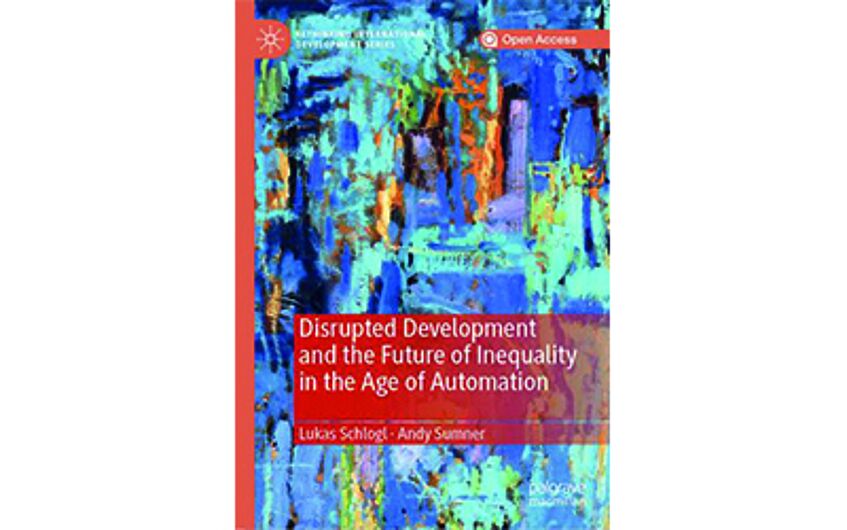


New open-access monograph by Lukas Schlögl: Disrupted Development and the Future of Inequality in the Age of Automation
This open access book examines the future of inequality, work and wages in the age of automation with a focus on developing countries. The authors argue that the rise of a global ‘robot reserve army’ has profound effects on labor markets and economic development, but, rather than causing mass unemployment, new technologies are more likely to lead to stagnant wages and premature deindustrialization. The book illuminates the debate on the impact of automation upon economic development, in particular issues of poverty, inequality and work. It highlights public policy responses and strategies–ranging from containment to coping mechanisms—to confront the effects of automation.
Find the Open Access Book here
New working paper by Lukas Schlögl: Leapfrogging into the unknown - The future of structural change in the developing world
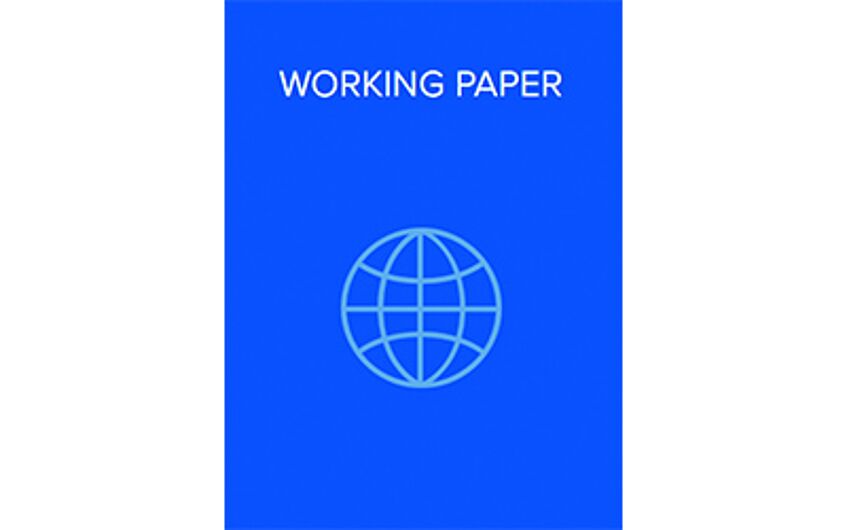


New working paper by Lukas Schlögl: Leapfrogging into the unknown - The future of structural change in the developing world
This paper traces a set of major trends and future scenarios in global structural change. It argues that across multiple domains of change, developing economies are facing novel constellations of lateness and prematurity in technological and economic development.
The paper explores these novel constellations in employment and value added, global trade, and technological upgrading.
It argues that an expansion of service sector work in lockstep with rising economic development will likely continue to shape the medium-term future of structural transformation, albeit with trends of convergence and a hybridization of sectors.
New employment challenges may be emerging for participants in a global value chain due to the debated threat of ‘reshoring’ of offshored production.
The paper finally discusses automation in the non-tradable sector and the ramifications of technological leapfrogging or ‘technology creep’ for the future of structural change.
Find the Working Paper here
Special Issue by Barbara Prainsack in the Journal "Policy Studies"
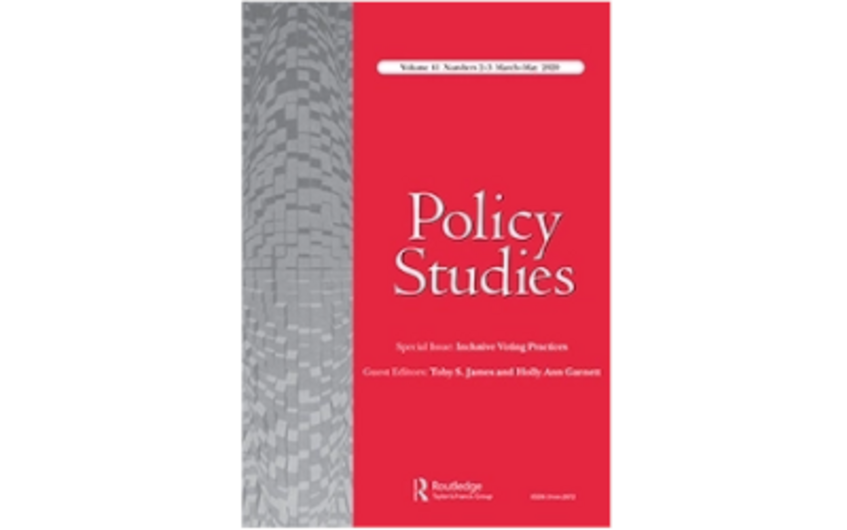


Special Issue by Barbara Prainsack in the Journal "Policy Studies"
Barbara Prainsack edited a Special Issue of “Policy Studies” on the political economy of digital data. Her own contribution discusses the use of healthcare data for the purpose of nudging. Find her contribution here. The Introduction to the Special Issue with an overview of all papers is available here.
Barbara Prainsack as Speaker at the Launch of AMR Social Science at the Marie Bashir Institute (University of Sydney)
The AMR Social Science at the Marie Bashir Institut (MBI) will be launchen on 2nd March 2020 with a workshop which will bring together leading experts in the humanities and social sciences to critically examine the precursors of, and potential solutions to, AMR across contexts and cultures. Barbara Prainsack will give a pelnary lecture on "Solidarity in human-(anti)microbial relations".
Further information
Programme
Nikolas Rose’s visit at CeSCoS
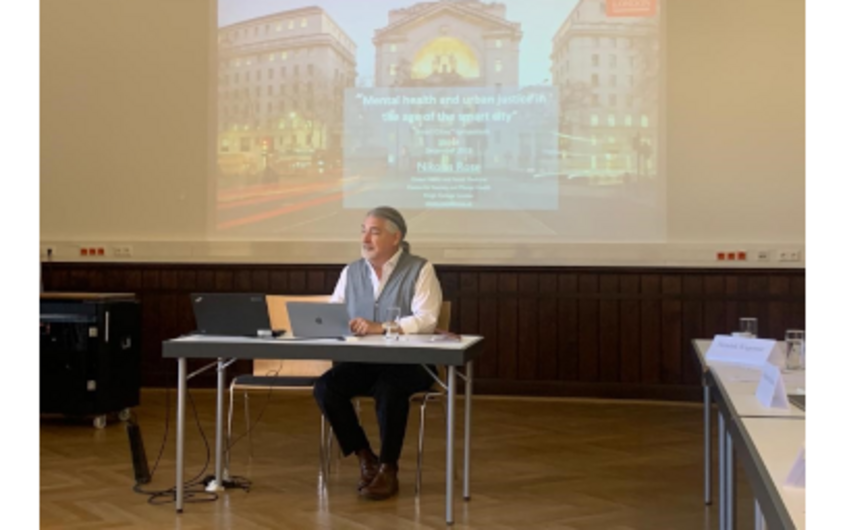


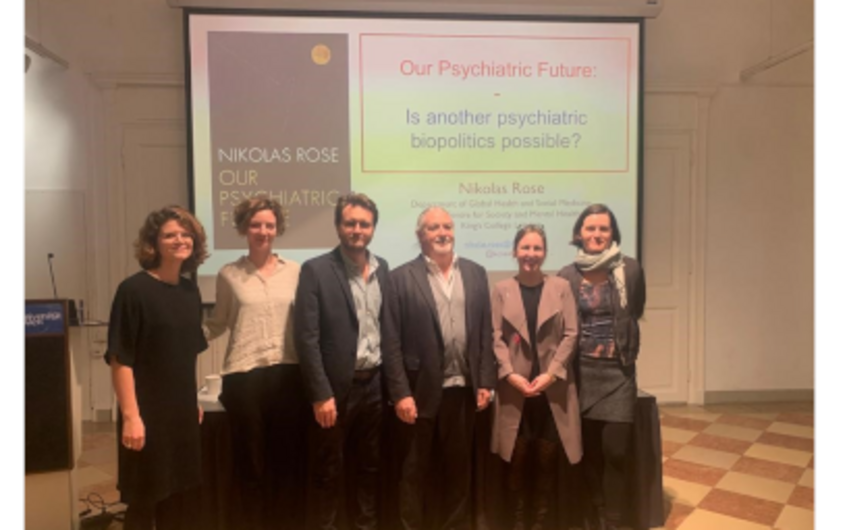
(f.l.t.r.: Katharina T. Paul, Wanda Spahl, Lukas Schlögl, Nikolas Rose, Barbara Prainsack, Mirjam Pot)

(f.l.t.r.: Katharina T. Paul, Wanda Spahl, Lukas Schlögl, Nikolas Rose, Barbara Prainsack, Mirjam Pot)

(f.l.t.r.: Katharina T. Paul, Wanda Spahl, Lukas Schlögl, Nikolas Rose, Barbara Prainsack, Mirjam Pot)
Nikolas Rose’s visit at CeSCoS
From 9-13 December 2020 we had the pleasure to host the renowned sociologist and social theorist Professor Nikolas Rose (King’s College London). We organised a number of events around his visit, engaging diverse academic publics in exchange and discussion on topics ranging from the future of psychiatrics biopolitics to urban justice in times of digitisation.
The series of events started off with an inspiring Masterclass in which PhD students from our research group as well as other departments within and beyond the University of Vienna presented and discussed their projects with Nikolas Rose. Professor Rose did not only comment on each individual project, but also provided valuable advice on how to transform empirically grounded work into conceptually rich results.
On 11 December we held a symposium with participants from a broad variety of disciplinary backgrounds to critically discuss what “smart cities” could and should mean in the 21st century. Our aim was to explore this question by going beyond the focus on digital technologies and datafication. Nikolas Rose opened the symposium with a talk on “Mental Health and Urban Justice in the Age of the Smart City”, which was followed by presentations by other participants and lively discussion of conceptualisations of “the smart city” as a socio-technological imaginary, the renegotiation of public space, and the need to foreground social and economic justice in discussing the present and future of cities.
In the evening of the same day, Professor Rose gave a public lecture on “Our Psychiatric Future: Is Another Psychiatric Biopolitics Possible?”. He stressed the need to move away from the dominant but narrow neuroscientific approach to mental illness towards the incorporation of patients’ social life worlds into psychiatry, as well as a stronger focus on social determinants.
CeSCoS would like to thank Professor Nikolas Rose for visiting us and presenting his recent and ongoing work in such an intellectually stimulating ways. We also thank all participants for their engagement and the interesting discussions in all the events.
Listen here to the public lecture on “Our Psychiatric Future: Is Another Psychiatric Biopolitics Possible?":
Barbara Prainsack at TRT Worlds "Roundtable" on "Precision Medicine: Healthcare revolution?"



Barbara Prainsack at TRT Worlds "Roundtable" on "Precision Medicine: Healthcare revolution?"
Roundtable is a discussion programme with an edge. Broadcast out of London and presented by David Foster, it's about bringing people to the table, listening to every opinion, and analysing every point of view. From fierce debate to reflective thinking, Roundtable discussions offer a different perspective on the issues that matter to you.
On Wednesday 20th November 2019, the topic of the roundtable was "Precision Medicine: Healthcare revolution?". Besides Barbara Prainsack, Joyce Harper (University College London), Catherine Joynson (Nuffield Council on Bioethics) and Patrick Short (Sano Genetics) took part in the discussion.
New Paper by Mirjam Pot, Wanda Spahl & Barbara Prainsack
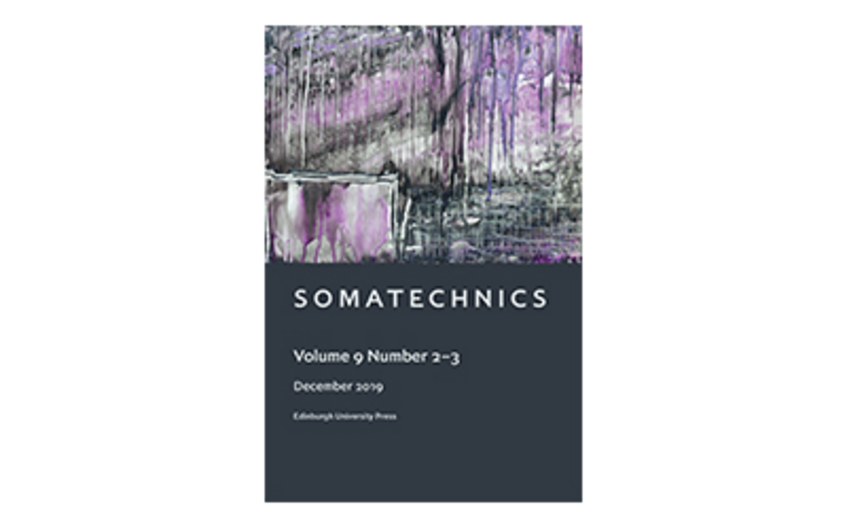


New Paper by Mirjam Pot, Wanda Spahl & Barbara Prainsack
The new paper "The Gender of Biomedical Data: Challenges for Personalised and Precision Medicine" is published in Somatechnics. Somatechnics presents a thorougly multi-disciplinary scholarship on "the body". The overarching theme of volume 9 is "Data Matters: (Un)doing Data and Gender in the Life Sciences & Pharmacological and Carceral Bodies".
Full Text
Barbara Prainsack is Panelist at the Workshop: Public Involvement and Governance in Population-Level Biomedical Research
The Workshop Public Involvement and Governance in Population-Level Biomedical Research takes place in Oxford on the 9th and 20th January 2020.
Biomedical research increasingly focuses on the collection, collation, and analysis of big data for population-level research. However, such research poses challenges to traditional systems of research governance, pushing against existing conceptions of research participants and informed consent, and in doing so, raising concerns related to privacy, data protection, and trust. In response, models of public involvement in governance are being proposed to fill gaps in oversight and restore public trust.
Keynote Speakers
Jonathan Montgomery, University College London
Barbara Koenig, University of California, San Fransisco
Confirmed Panellists
Michael Burgess, The University of British Columbia
Victoria Chico, University of Sheffield
Aaron Goldenberg, Case Western Reserve University
Michelle McGowan, Cincinnati Children’s Hospital
Barbara Prainsack, University of Vienna
Mahsa Shabani, University of Leuven
Barbara Prainsack will hold a talk within the lecture series "Taming the Machines"
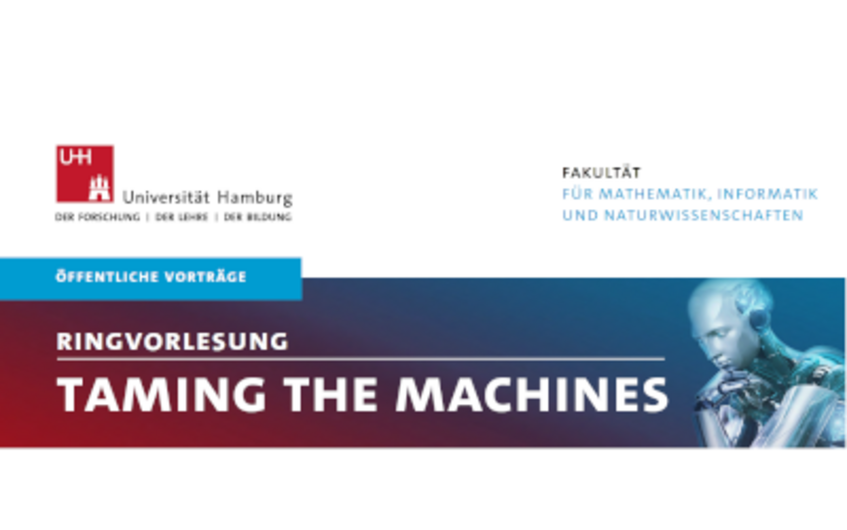

Barbara Prainsack will hold a talk within the lecture series "Taming the Machines"
On 4. December 2019 Barbara Prainsack will give a talk on "The Value of Data in Healthcare: Beyond Nudging". The talk takes place within the lecture series "Taming the Machines" organised by the Department of Informatics (University of Hamburg). This public lecture series invites internationally renowned scholars to discuss major normative questions related to the design, use and regulation of information technology for a good society.
New Journal Article by Wanda Spahl & August Österle
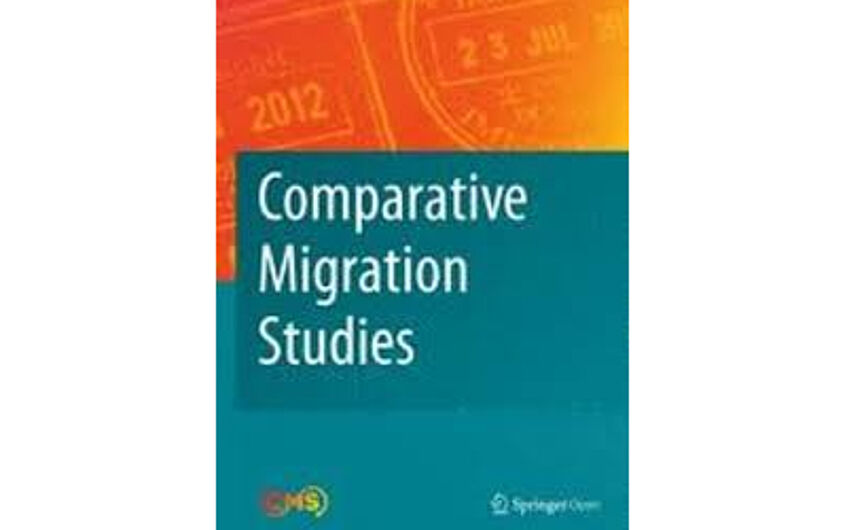

New Journal Article by Wanda Spahl & August Österle
The new article "Stratified membership: health care access for urban refugees in Turkey", published in the Comparative Migration Studies Journal, examines developements in the light of stratified membership theories. More specifically, it asks how far the healthcare system in Turkey can be categorised as a system of stratified membership for different groups of urban refugees, focusing on refugees from Syria, Iraq and Afghanistan.
Abstract:
Turkey hosts more refugees than any other country in the world. Incoming numbers have increased steadily since the outbreak of the Syrian war in 2011. This raises enormous challenges for the host country, not least with regard to the provision of healthcare. This article examines the developments in the light of stratified membership theories. More specifically, it asks how far the healthcare system in Turkey can be categorised as a system of stratified membership for different groups of urban refugees, focusing on refugees from Syria, Iraq and Afghanistan. Following a theoretical debate about stratification in the provision of social rights, 16 semi-structured interviews with experts and active participants were carried out in Ankara to understand the situation of urban refugees in need of healthcare. The results confirm assumptions of stratified membership theories which understand citizenship in a broad sense as comprising the interconnected dynamics between social rights, legal status and identity requirements. Next to ethnic categories of origin defining the status in Turkey, factors such as language skills or the individual economic situation also play crucial roles for stratified membership both as an empirical fact and as a constructed practice.
Full Article
The Value(s) of Precision Medicine: Societal, Political, and Ethical Aspects
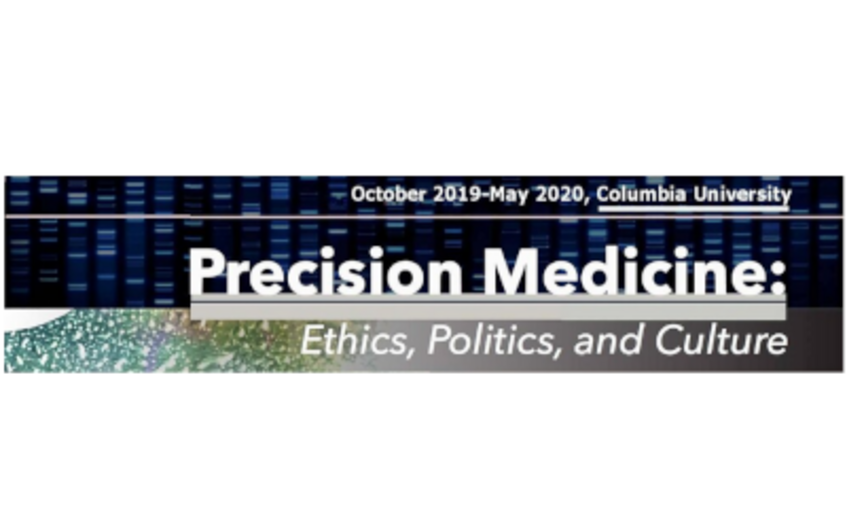

The Value(s) of Precision Medicine: Societal, Political, and Ethical Aspects
The Precision Medicine: Ethics, Politics, and Culture Project welcomes Professor Barbara Prainsack to give a talk on “The Value(s) of Precision Medicine: Societal, Political, and Ethical Aspects”, on Wednesday, May 6th 2020, 5pm-7pm at the University of Columbia, USA.
Find further information here.
Call for participation: Master Class with Dr Mark Flear
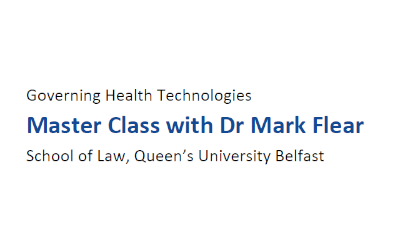

Call for participation: Master Class with Dr Mark Flear
In November, Dr Mark Flear is going to visit the Centre for the Study of Contemporary Solidarity. On November 20, Mark will give an invited lecture in the lecture series of the Department of Political Science. In addition, we also organize a Master Class for doctoral students and early career researchers. The idea of the class is to enable early career researchers to discuss their work and ideas with Mark and to provide a space that allows them to enter into conversation with one another. Doctoral students and early career researchers from all departments and disciplines are welcome (including law, political science, science and technology studies, and others!)
When: November 21, 2019, 10.00-13.00
Where: University of Vienna, Department of Political Science, Conference Room (Neues Institutsgebäude, Universitätsstraße 7, 2nd floor, Trakt A)
If you are interested in presenting and discussing your work, please send a short message to Ingrid Metzler (ingrid.metzler@univie.ac.at) by October 5, 2019. It would be helpful if you could describe the project, dissertation or paper that you wish to discuss in a couple of sentences. Moreover, we will ask you to send an extended abstract of approximately 1000-1500 words by November 17. These abstracts will be shared among all participants of the Master Class.
Dr Mark Flear is Reader/Associate Professor in Law at Queen’s University Belfast. Dr Flear’s work explores the interactions between European law, science and technology, with a focus on public health and new health technologies. Dr Flear has a special interest in citizen participation in science-based issues and using it to tease out the normative implications of the scientific and technical. Dr Flear contributes widely to all these areas, including through his monograph Governing Public Health (Hart Publishing 2015 pb; 2018 hb). This book provided the first examination of the EU as a biopolitical actor and reframed public health as a matter for citizen participation. Dr Flear is also the lead editor of and a key contributor to the pioneering European Law and New Health Technologies (OUP 2013). Through the latter Dr Flear identified the field and mapped out its broad contours. Dr Flear publishes in other leading collections on European law, and in journals such as the Medical Law Review and the Human Rights Law Review. Dr Flear is currently finalising the manuscript for a special issue of the Journal of Law and the Biosciences, which he is co-editing with Professor Richard Ashcroft. Dr Flear is also working with scholars from across Europe, Asia and Australia on a white paper on applying adaptive governance to health technologies.
Dr Flear has been a visiting scholar at the Faculty of Law, University of Cambridge and the Faculty of Law and Criminology, Vrije Universiteit Brussels. He has provided his expert view to the European Group on Ethics in Science and New Technologies, and has given invited lectures on a number of topics within his research areas, including at the Mason Institute, University of Edinburgh. Mark also has a regulatory role as an independent Member of the Northern Ireland DNA Database Governance Board.
The Masterclass is organized by the Centre for the Study of Contemporary Solidarity (CeSCos), the Department of Political Science, the Department of Science and Technology Studies, and the Research Focus Knowledge Societies in Turbulent Times.
"The Conversation" featured a new article by Barbara Prainsack (amongst others)


"The Conversation" featured a new article by Barbara Prainsack (amongst others)
The feature titled "How big data can affect your bank account - and life" is based on the article "Big Data Governance Needs More Collective Respnsibility: The Role of Harm Mitigation in the Governance of Data Use in Medicine and Beyond", written by Barbara Prainsack, Alena Buyx and Aisling McMahon.
The Conversation is a non-profit media outled that uses content courced from academics and researchers.
Barbara Prainsack has been interviewed by CNN


Barbara Prainsack has been interviewed by CNN
Barbara Prainsack has been interviewed by CNN on the ban of facial recognition in San Fransisco.
Find the video here.
New EDPS Podcast episode with Barbara Prainsack
A new podcast by the European Data Protection Supervisor (EDPS) featuring Ursula Huws (University of Hertfordshire), Aiha Nguyen (Data & Society), and our very own Barbara Prainsack, discusses digitisation and the future of work.
Listen here
Lukas Schlögl in Podcast on the Future(s) of Work


Lukas Schlögl in Podcast on the Future(s) of Work
In this podcast @jimmygreer talks to entrepreneurs, policy makers and academics about what has become known as the future of work. We discuss the challenges and opportunities of online platform working; why it is so important and to make this new way of working fair; how some freelancers are making the most of digital; the impact of automation (or should that be ‘automatability’?) on emerging and developing country jobs; and what to do about the so-called ‘rise of the robots’. This podcast is the first in a series exploring the themes from our research into business models of the future. Click here to read a short summary of our latest report on Business Models of the Future https://tinyurl.com/y3an5trg
Guests: Willem Pieter de Groen (Centre for European Policy Studies), Romain Trébuil (Yoss), Ellen Thijs (B-Hive), Natalya Sverensky (NOBL), Brando Benifei (MEP), Luke Schlögl (University of Vienna)
New Publication by Katharina Kieslich (i.a)
Among others (see below) Katharina Kieslich published a new article in the Journal of the Royal Society of Medicine on "National Institute for Health and Care Excellence, social values and healthcare priority setting".
Littlejohns, P., Chalkidou, K., Culyer, AJ., Weale, A., Rid, A., Kieslich, K., Coultas, C., Max, C., Manthorpe, J., Rumbold, B., Charlton, V., Roberts, H., Faden, R., Wilson, J., Krubiner, C., Mitchell, P., Wester, G., Whitty, JA. and Knight, S. (2019) 'National Institute for Health and Care Excellence, social values and healthcare priority setting', Journal of the Royal Society of Medicine. doi: 10.1177/0141076819842846.
New Publication by Katharina Kieslich
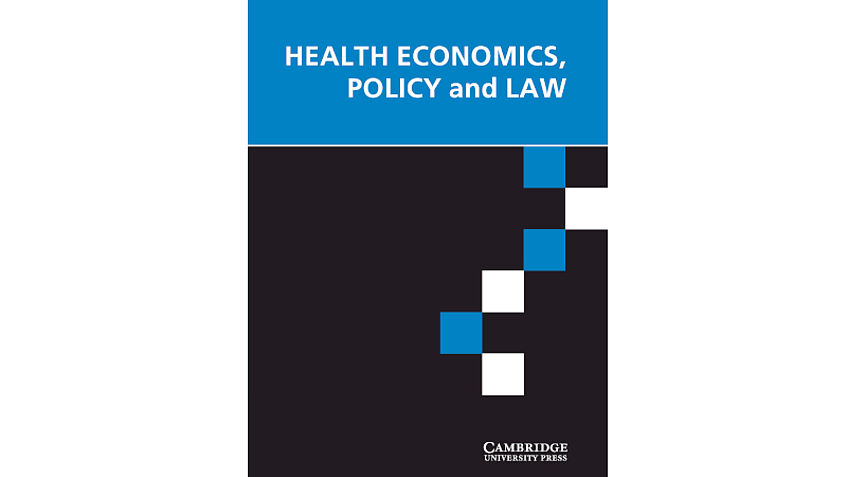

New Publication by Katharina Kieslich
Katharina Kieslich pusblied a new article with the title 'Paradigms in operation: explaining pharmaceutical benefit assessment outcomes in England and Germany' in the Journal of Health Economics
Abstract:
Health technology assessments (HTAs) are used as a policy tool to appraise the clinical value, or cost effectiveness, of new medicines to inform reimbursement decisions in health care. As HTA organisations have been established in different countries, it has become clear that the outcomes of medicine appraisals can vary from country to country, even though the same scientific evidence in the form of randomised controlled trials is available. The extant literature explains such variations with reference to institutional variables and administrative rules. However, little research has been conducted to advance the theoretical understanding of how variations in HTA outcomes might be explained. This paper compares cases of HTA in England and Germany using insights from Kuhn (1962, The Structure of Scientific Revolutions, 2nd edn. Chicago: The University of Chicago Press) and Hall (1993, Policy paradigms, social learning, and the state: the case of economic policymaking in Britain. Comparative Politics 25, 275–296) to demonstrate how policy paradigms can explain the outcomes of HTA processes. The paper finds that HTA outcomes are influenced by a combination of logical issues that require reasoning within a paradigm, and institutional and political issues that speak to the interaction between ideational and interest-based variables. It sets out an approach that advances the theoretical explanation of divergent HTA outcomes, and offers an analytical basis on which to assess current and future policy changes in HTA.
Kieslich, K. (2019) 'Paradigms in operation: explaining pharmaceutical benefit assessment outcomes in England and Germany'. Journal of Health Economics, Policy and Law. https://doi.org/10.1017/S1744133119000203
New book: Debating Unemployment Policy - Political Communication and the Labour Market in Western Europe
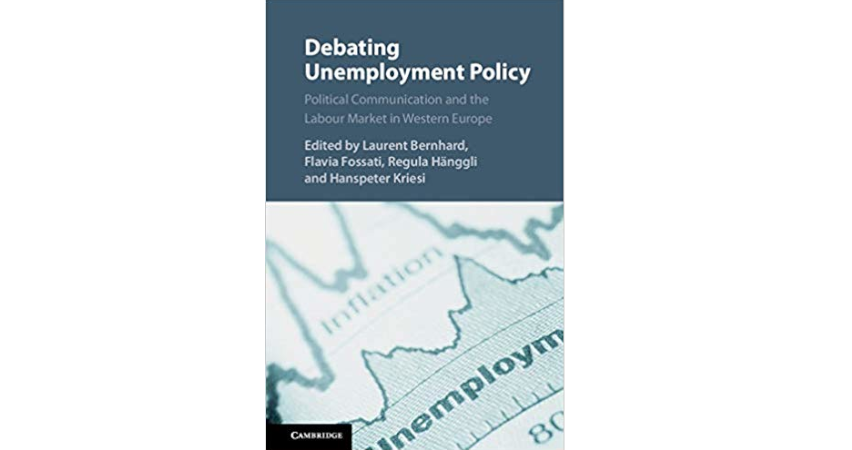

New book: Debating Unemployment Policy - Political Communication and the Labour Market in Western Europe
The new book is published by Cambridge University Press.
Edited by Laurent Bernhard, University of Zurich, Flavia Fossati, University of Vienna, Regula Hänggli, Université de Fribourg, Switzerland and Hanspeter Kriesi, European University Institute, Florence.
Description:
In 2008 the world experienced the Great Recession, a financial and economic crisis of enormous proportions and the greatest economic downturn since the 1930s. In its wake, unemployment became a key preoccupation of West European publics and politicians. This comparative study considers the policy debates surrounding unemployment in the United Kingdom, Germany, France, Italy, Denmark and Switzerland since 2008. With an over-arching focus on drawing out cross-national commonalities and differences, the authors ask whether patterns of political communication vary across countries. Their analysis draws on interviews with labour market policy-makers in the six selected countries, and paints a revealing picture. Appealing to researchers in comparative politics, political communication and welfare state research, this book will also interest practitioners involved in labour market policy.
Get your copy here.

